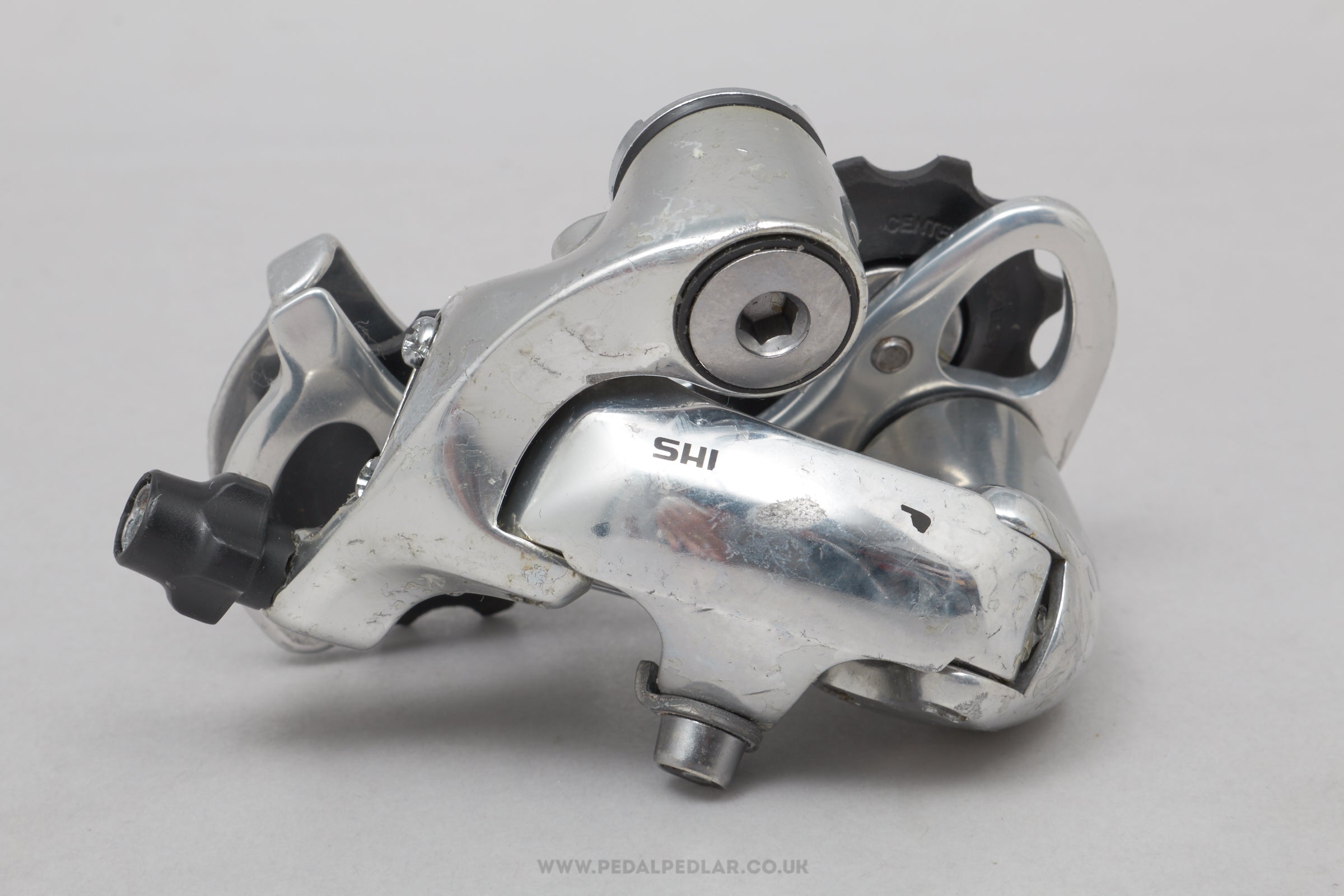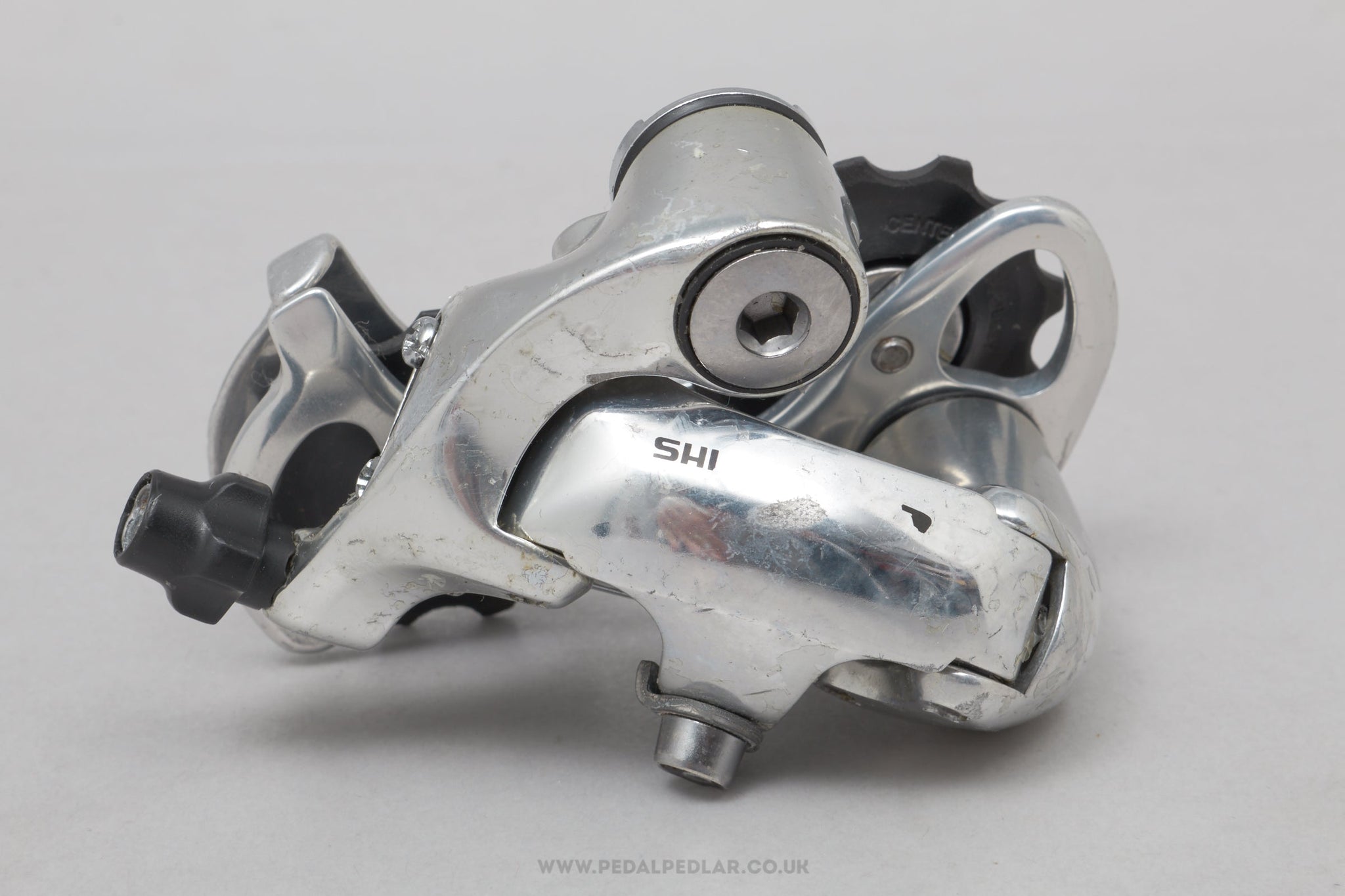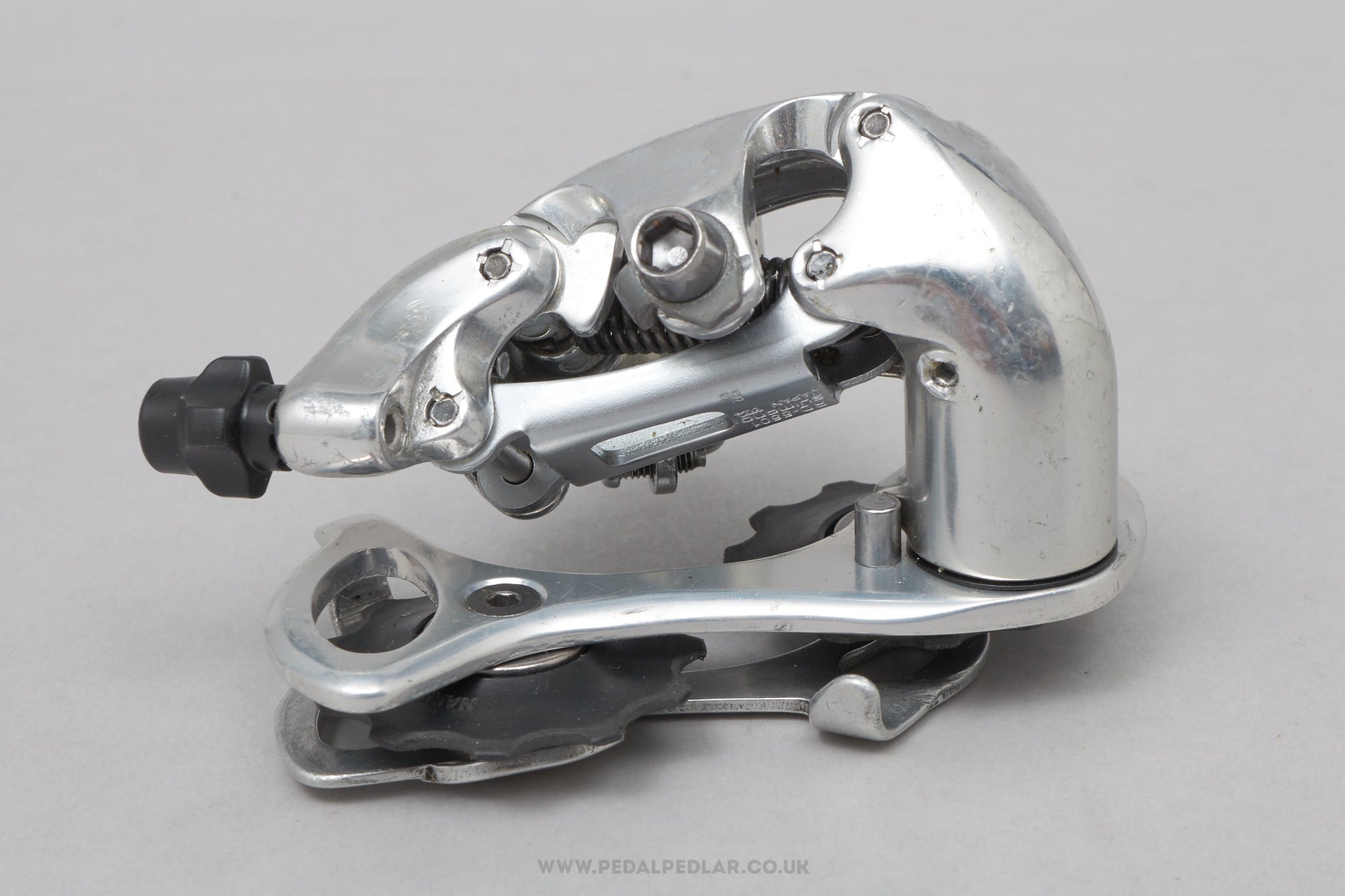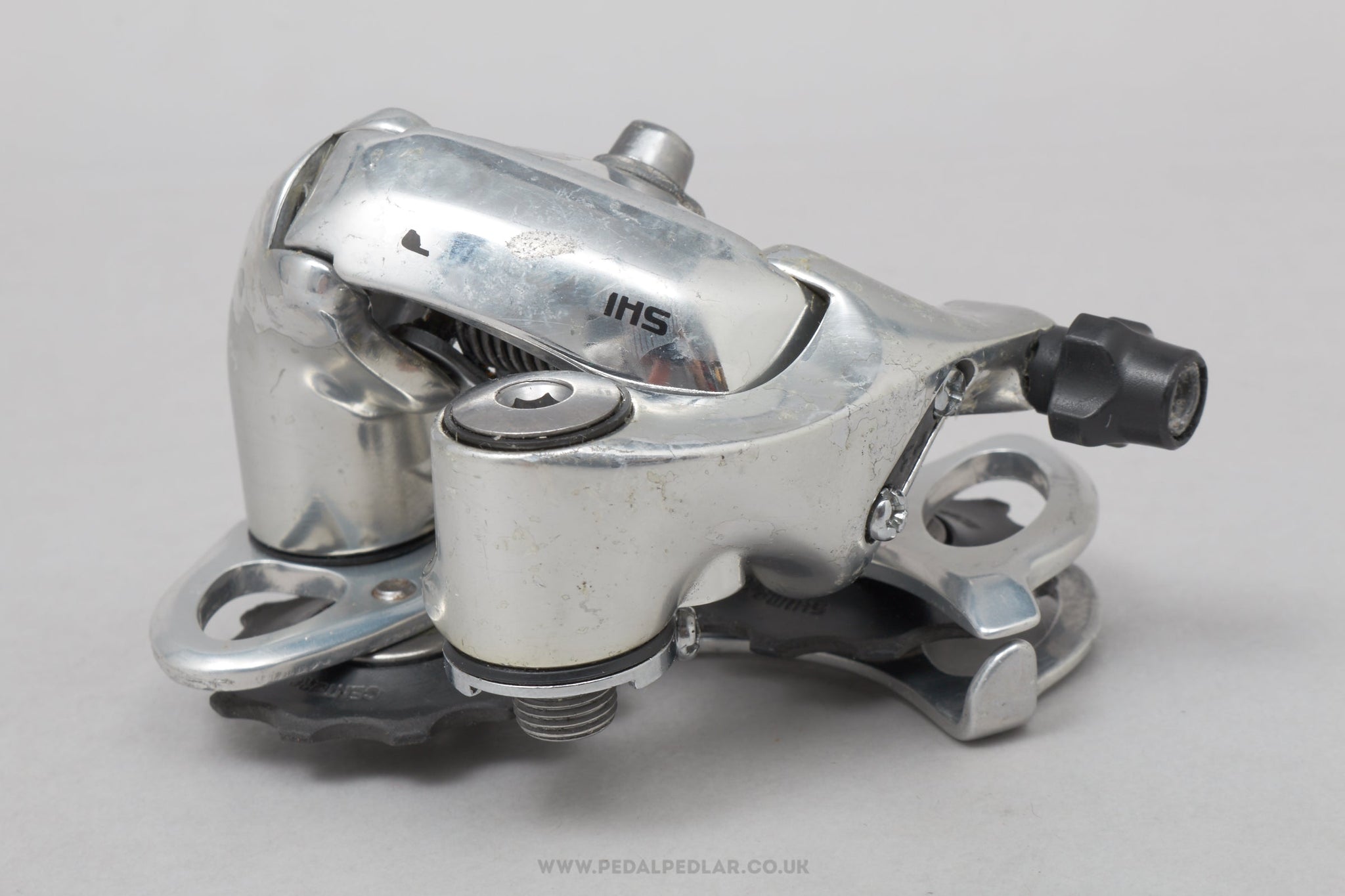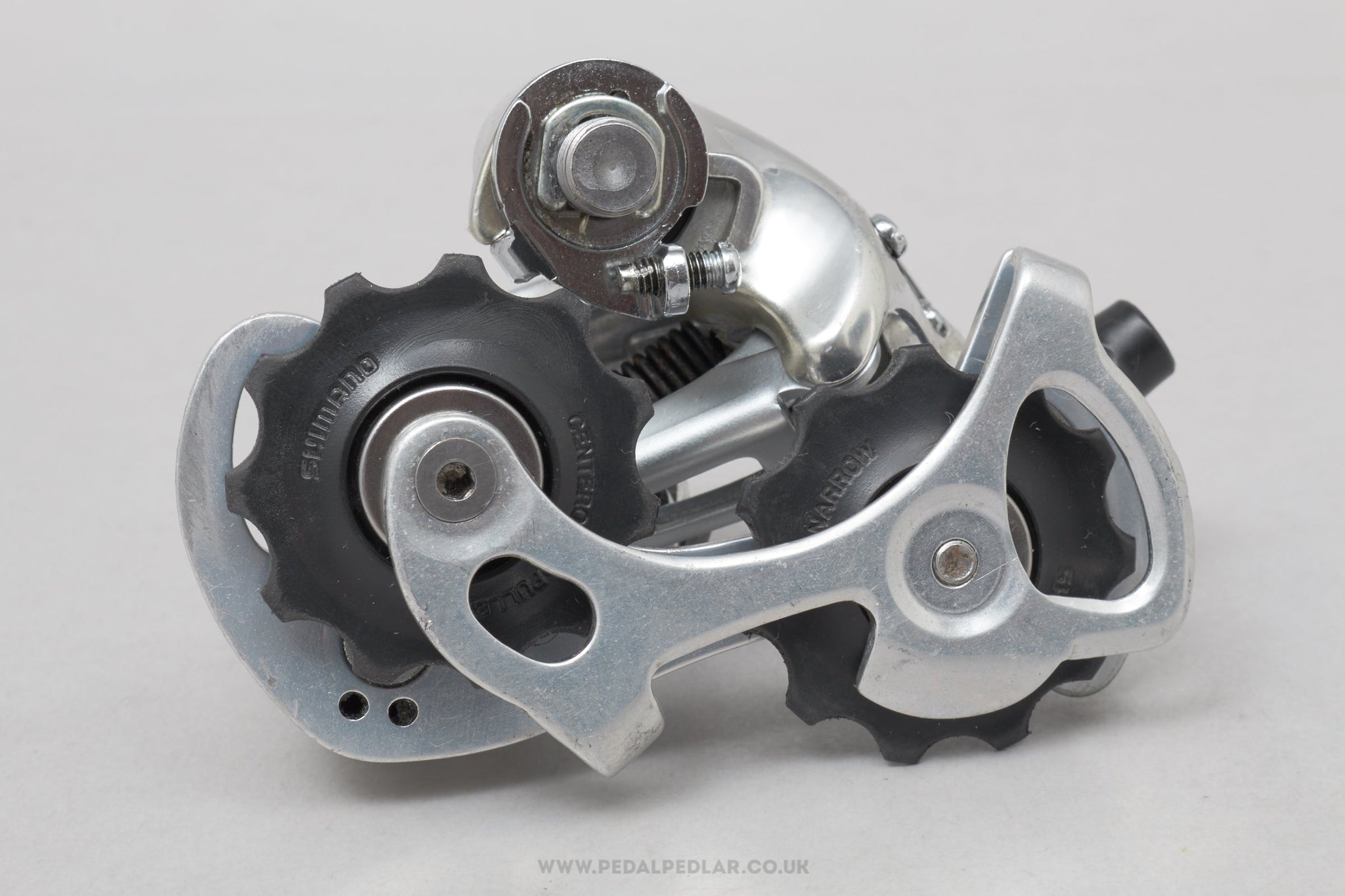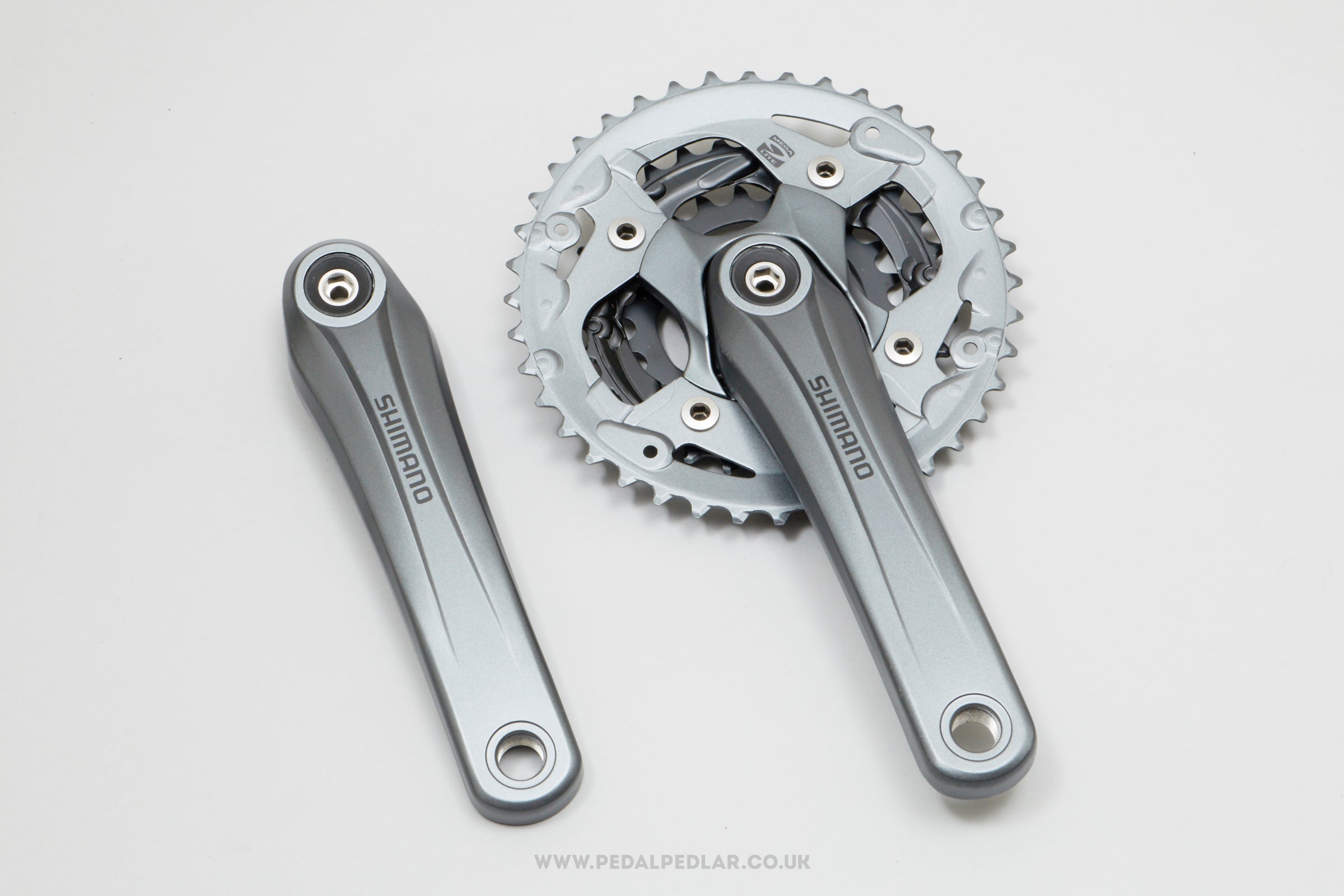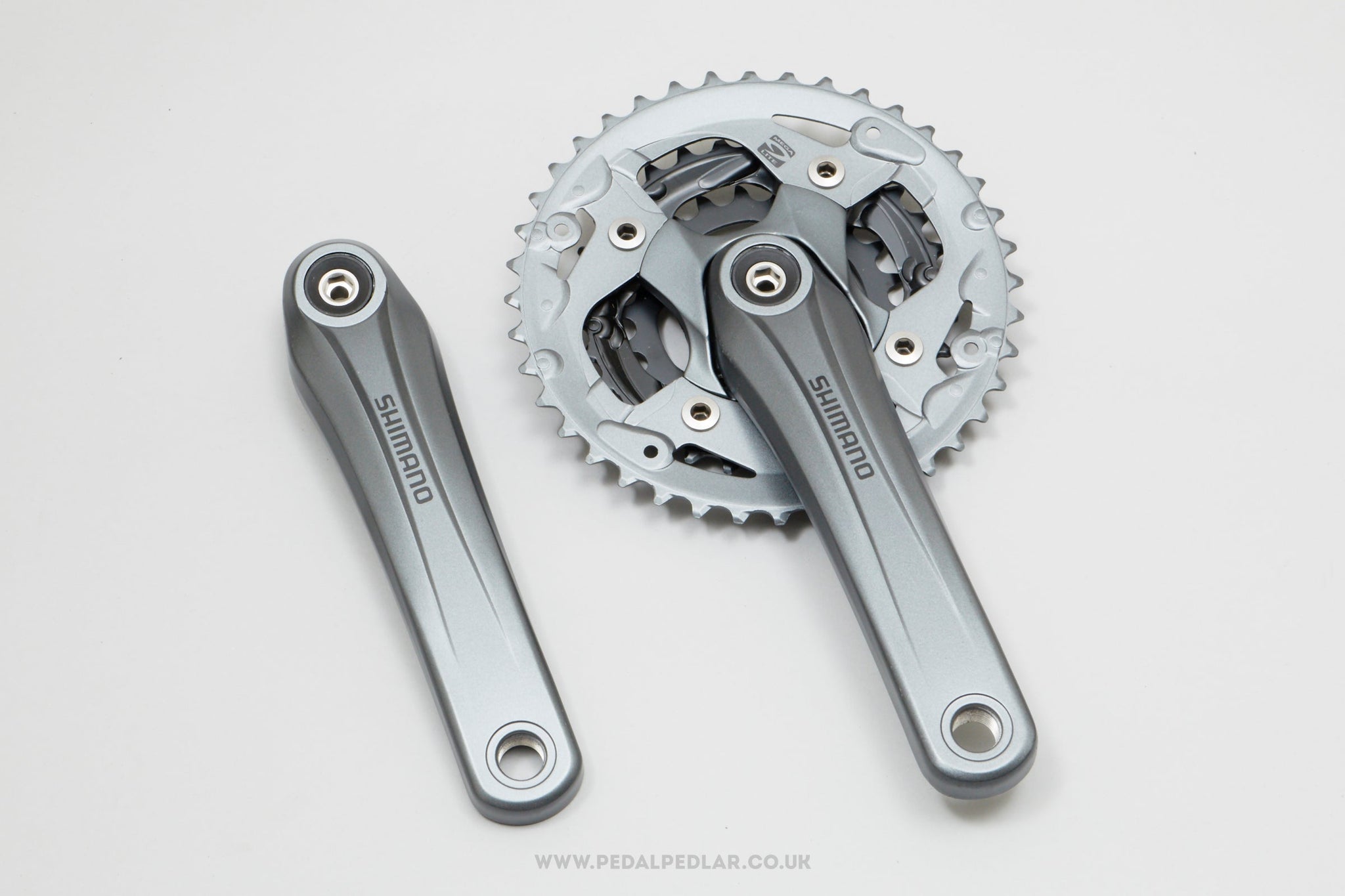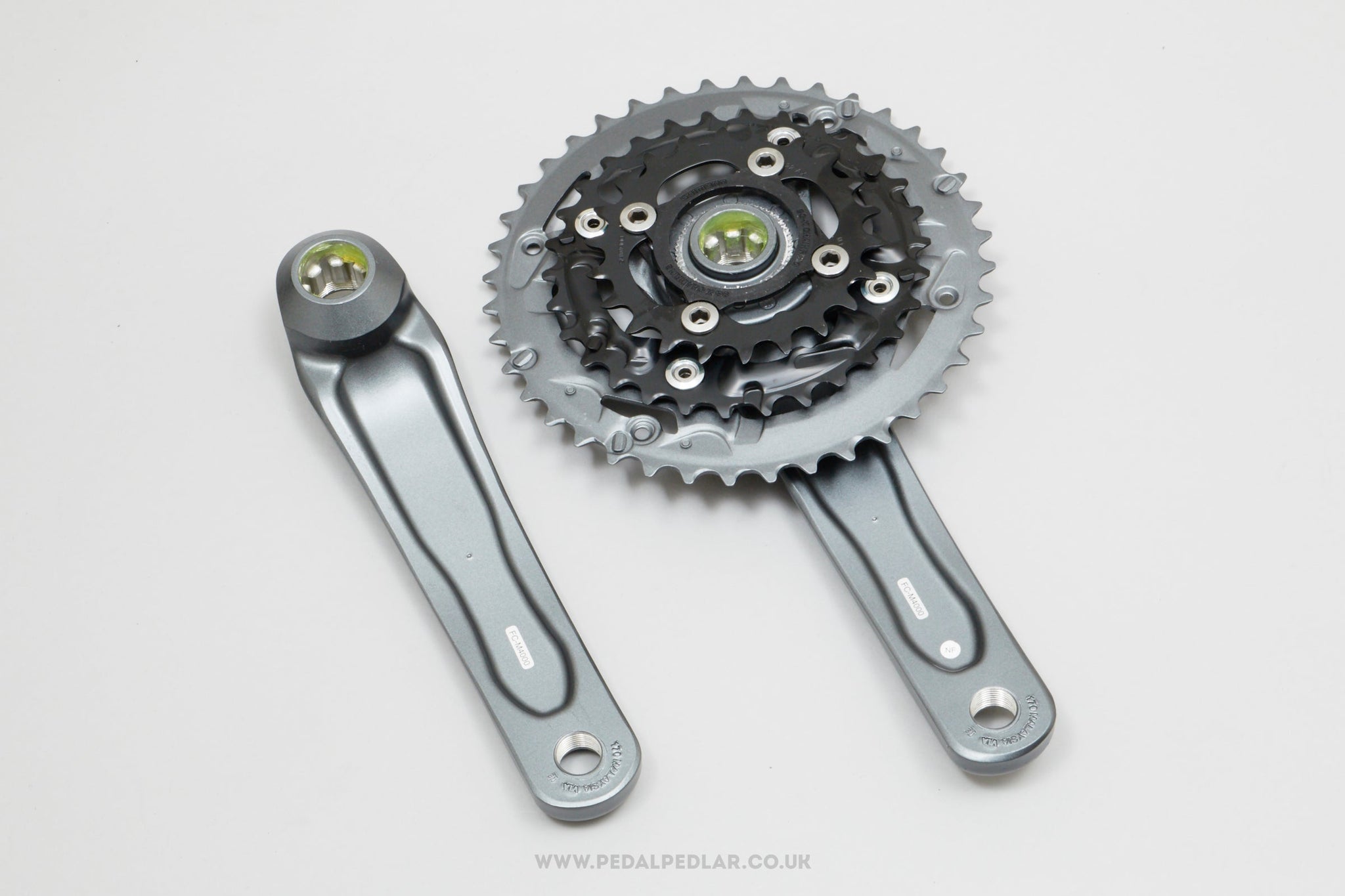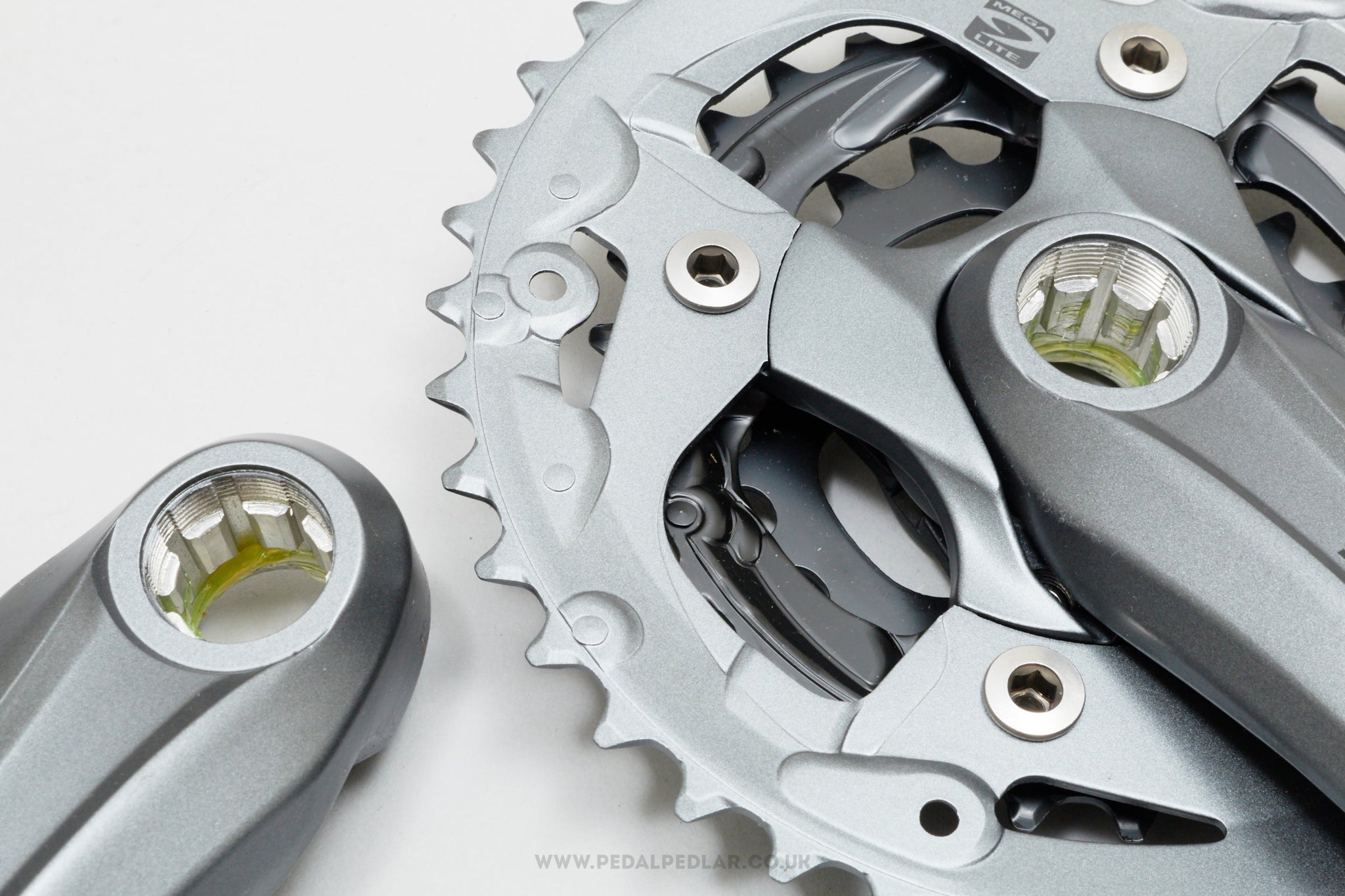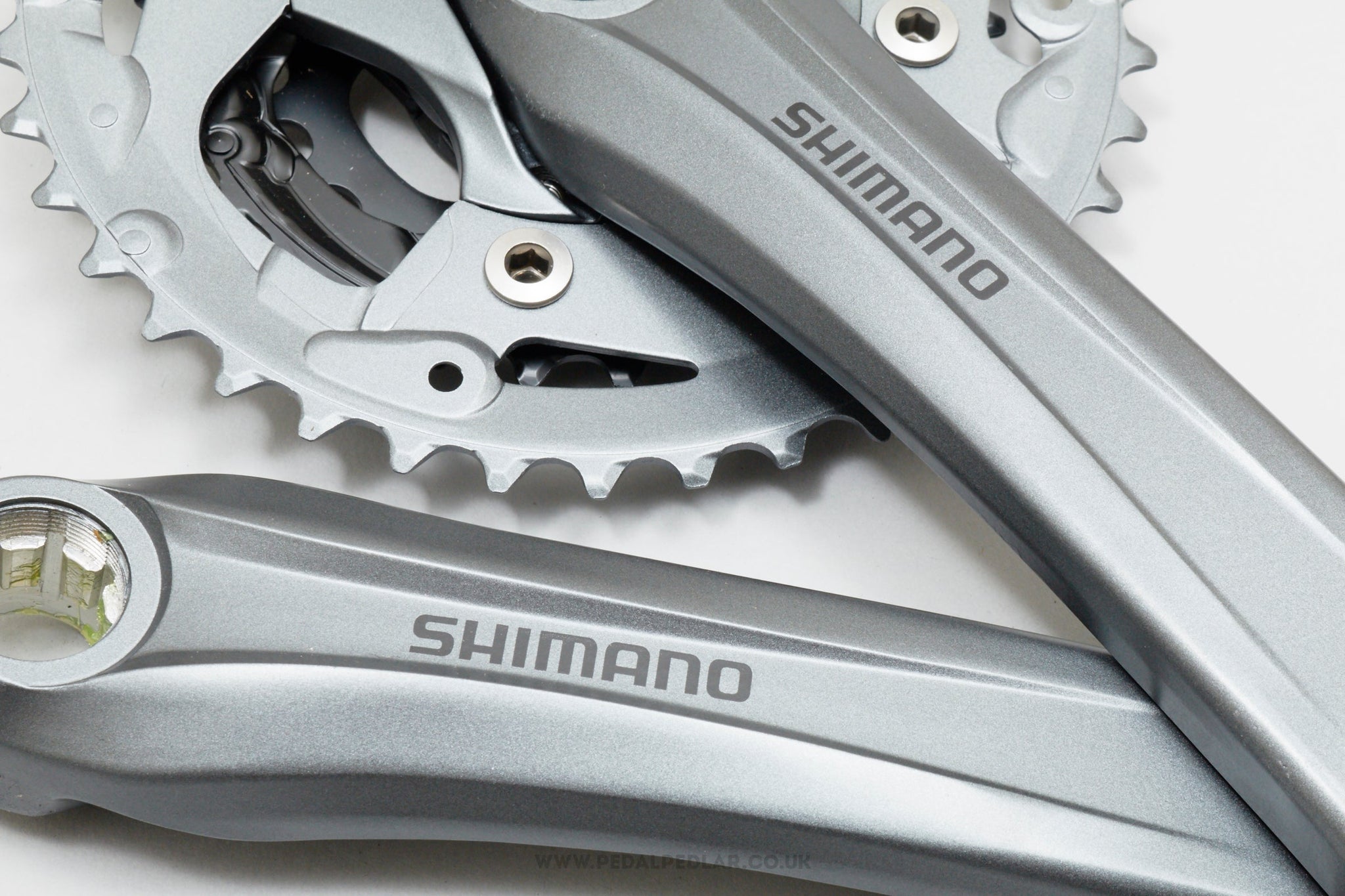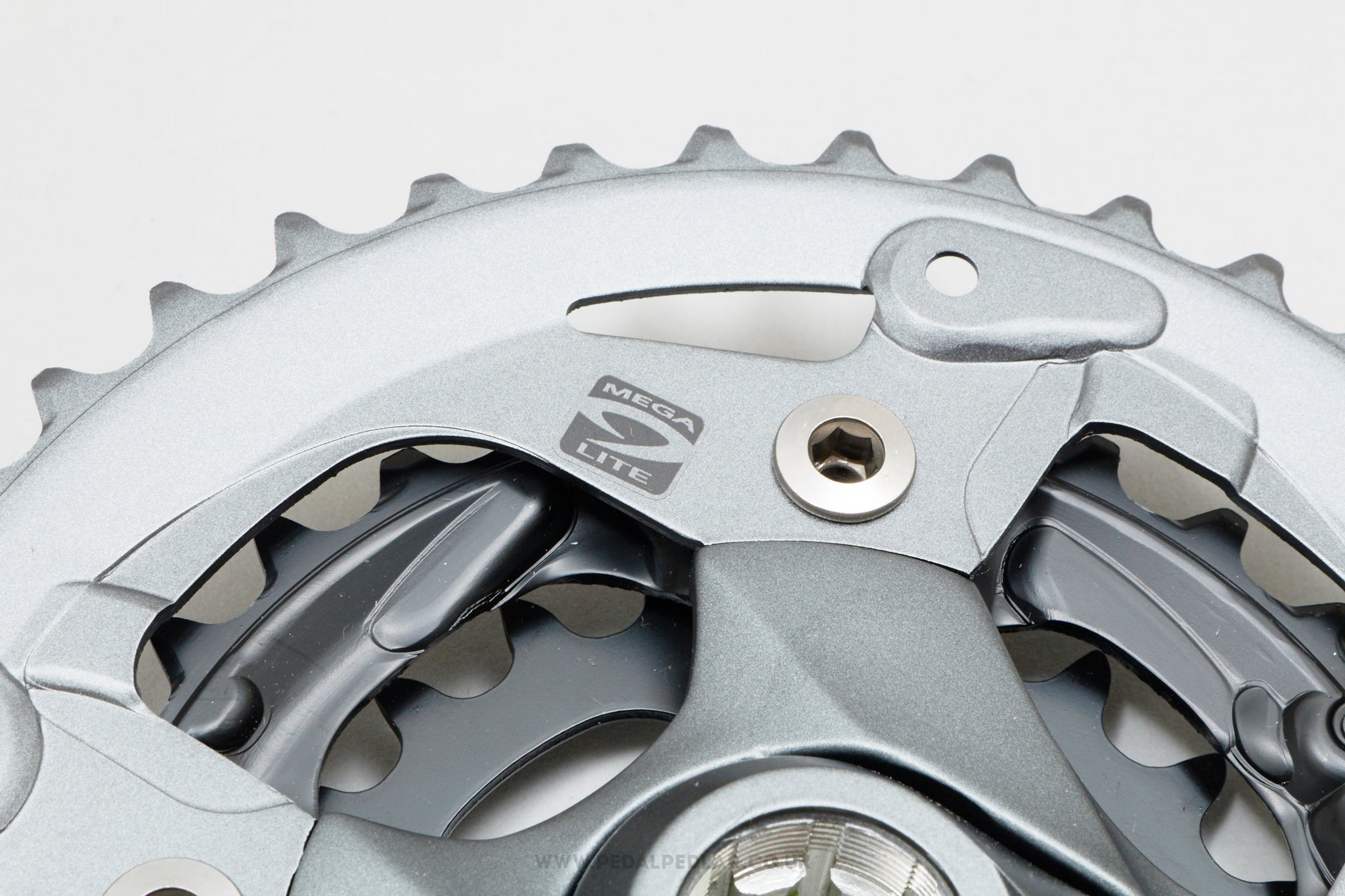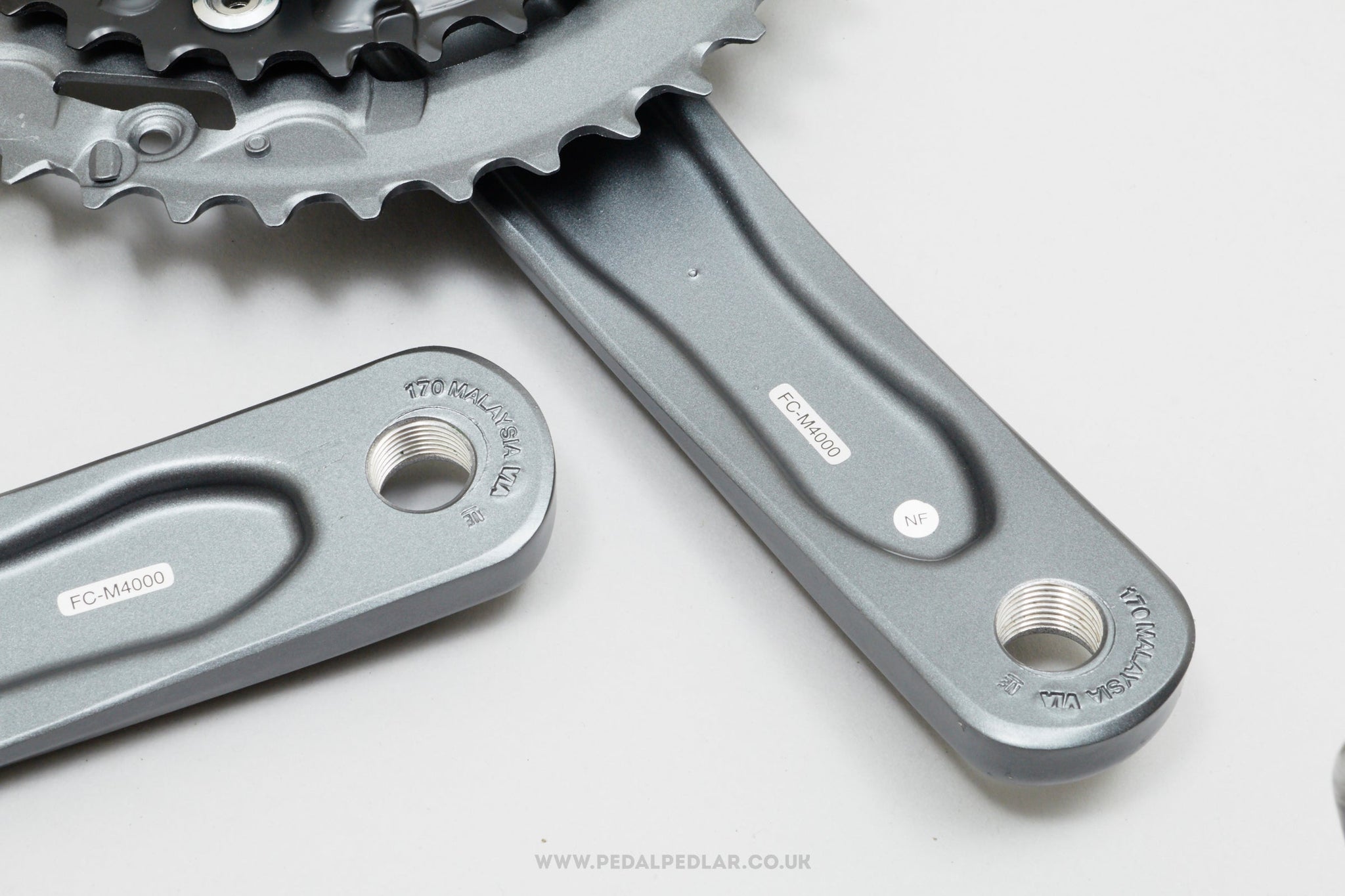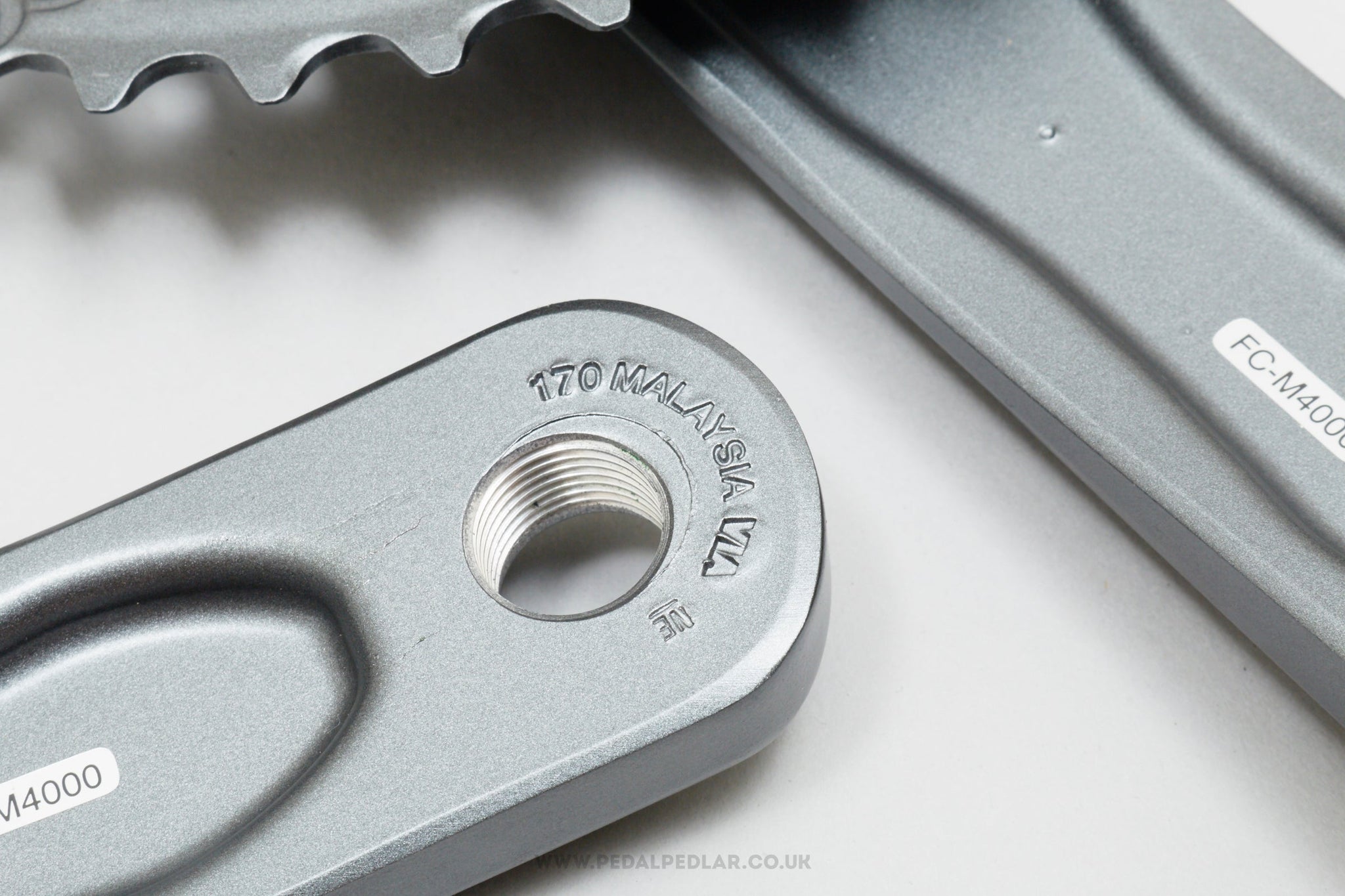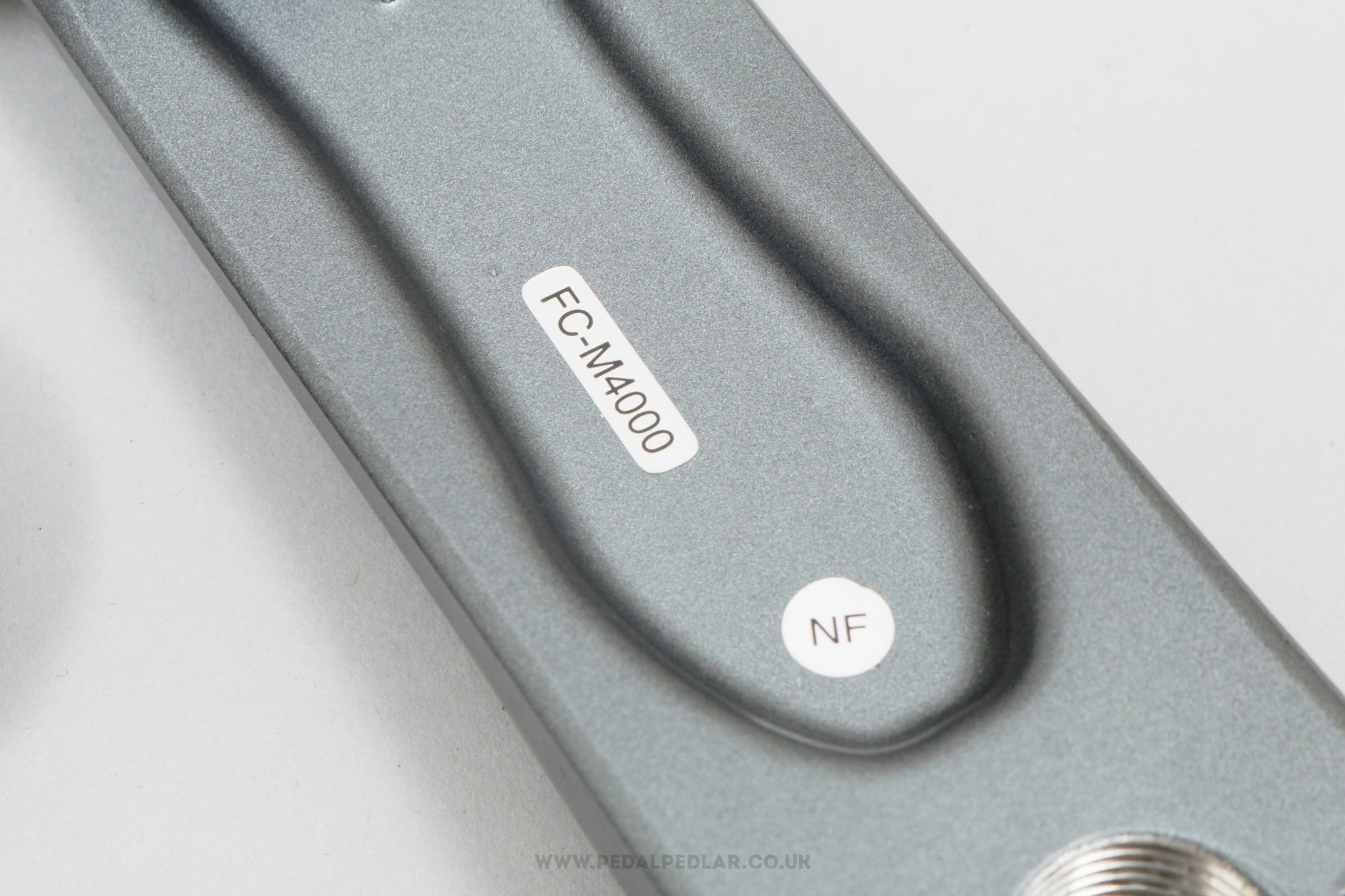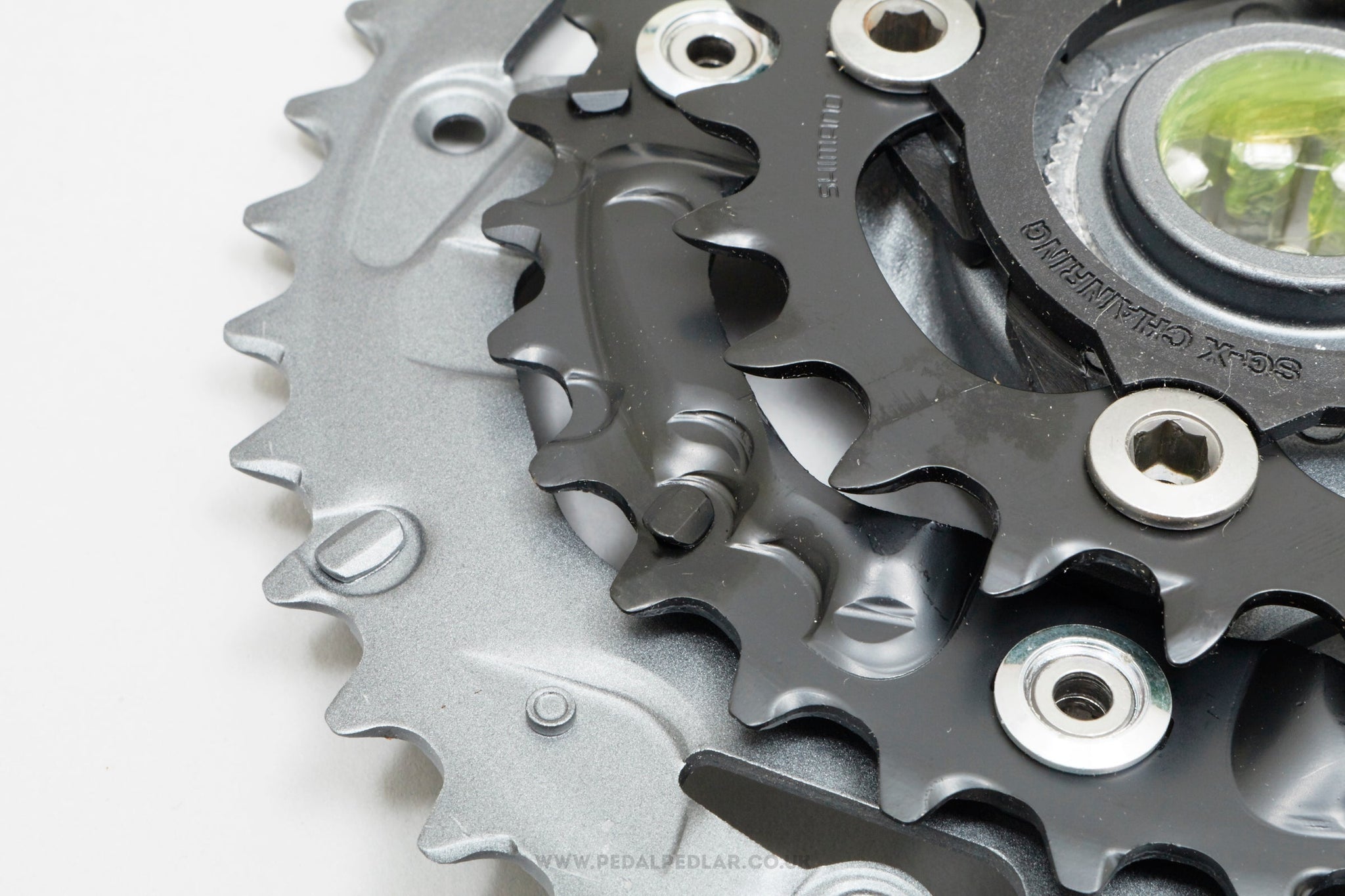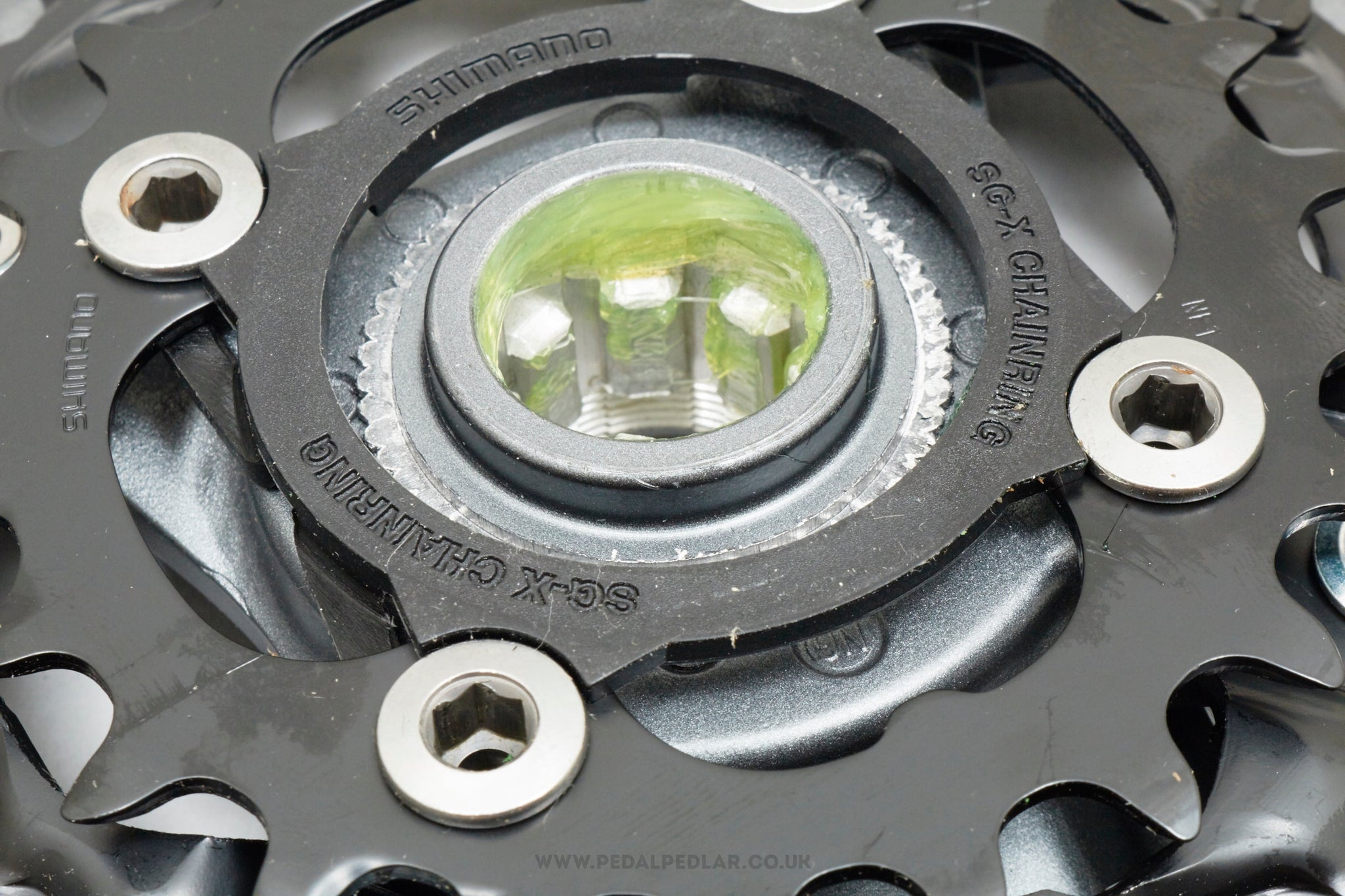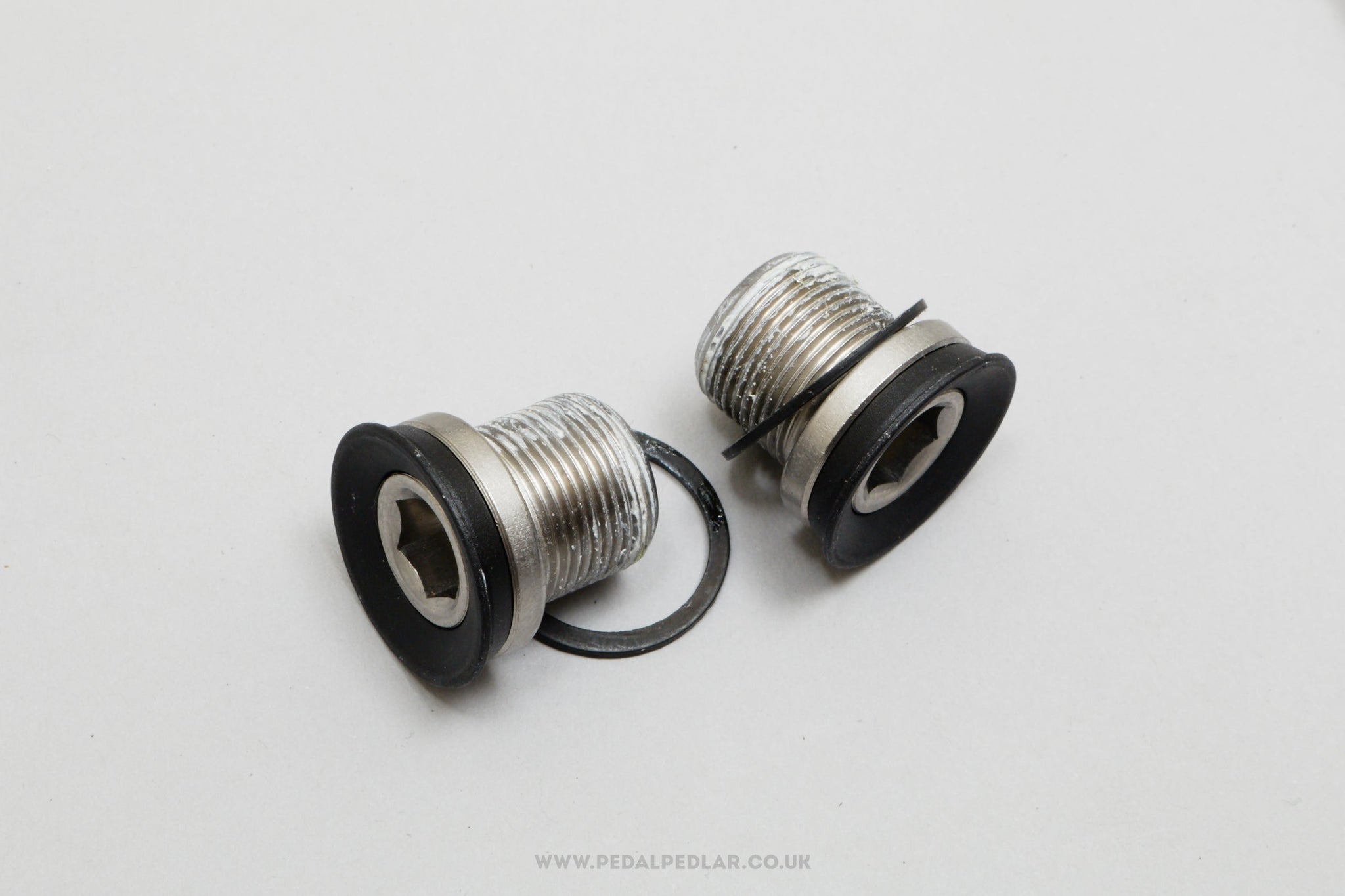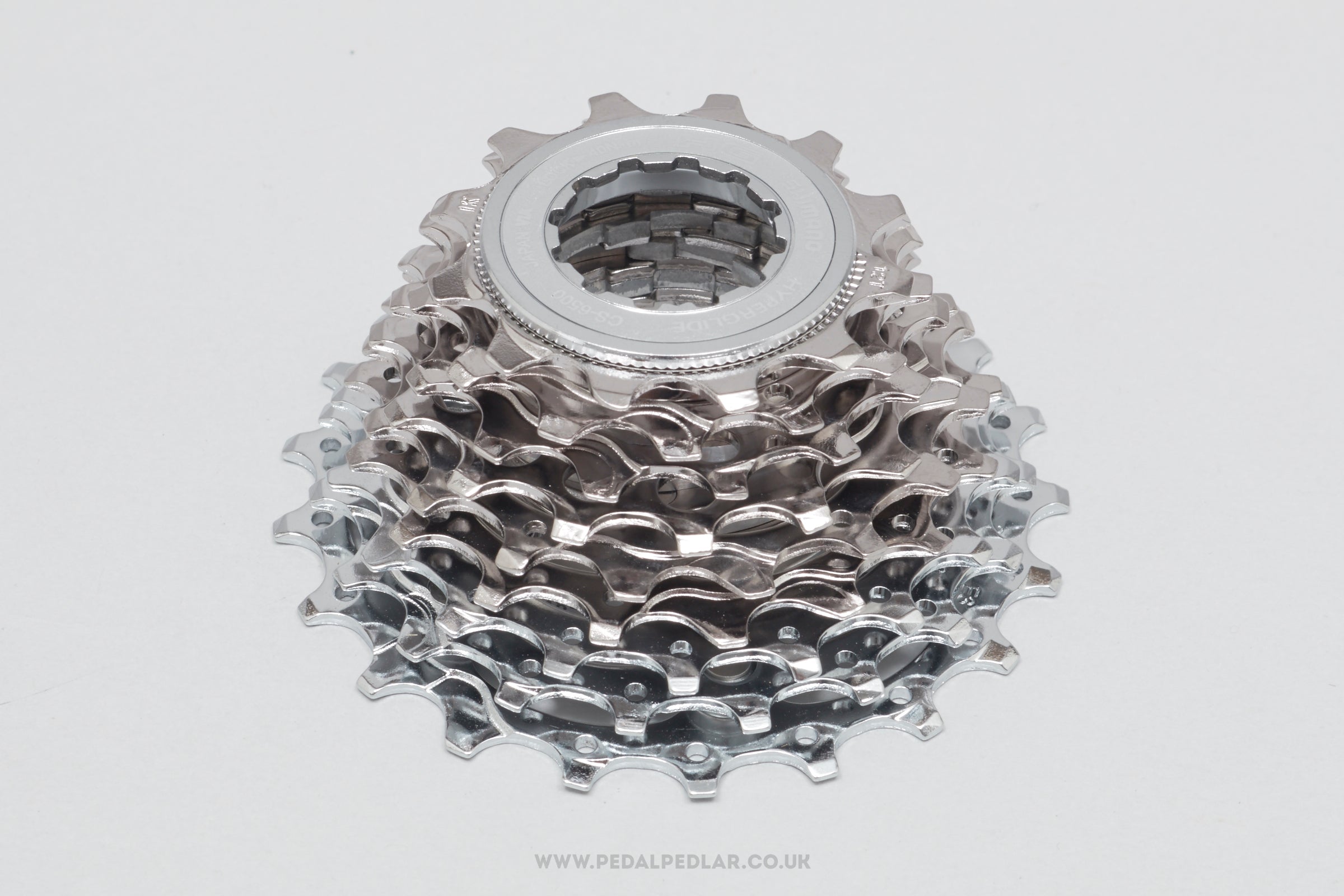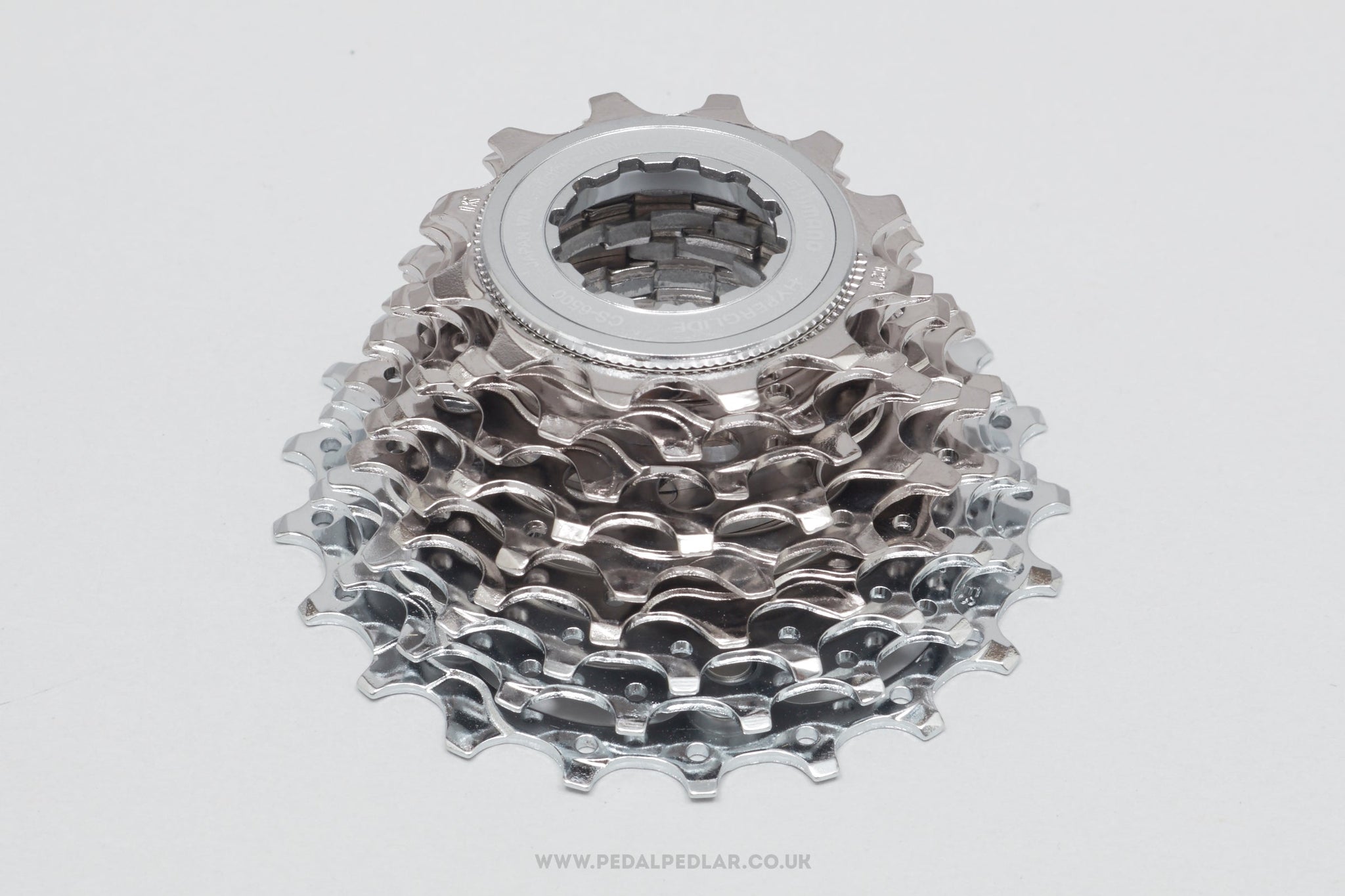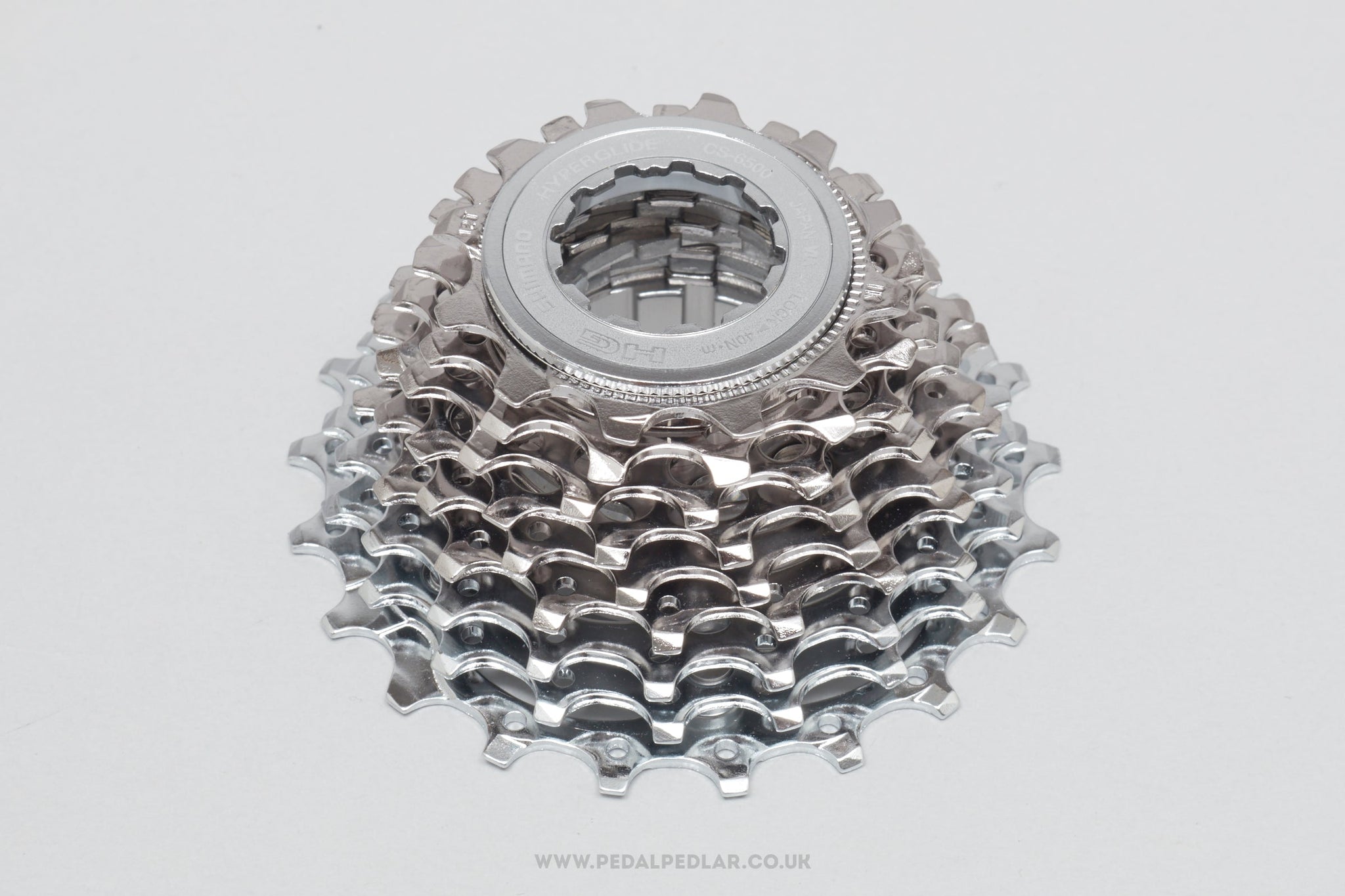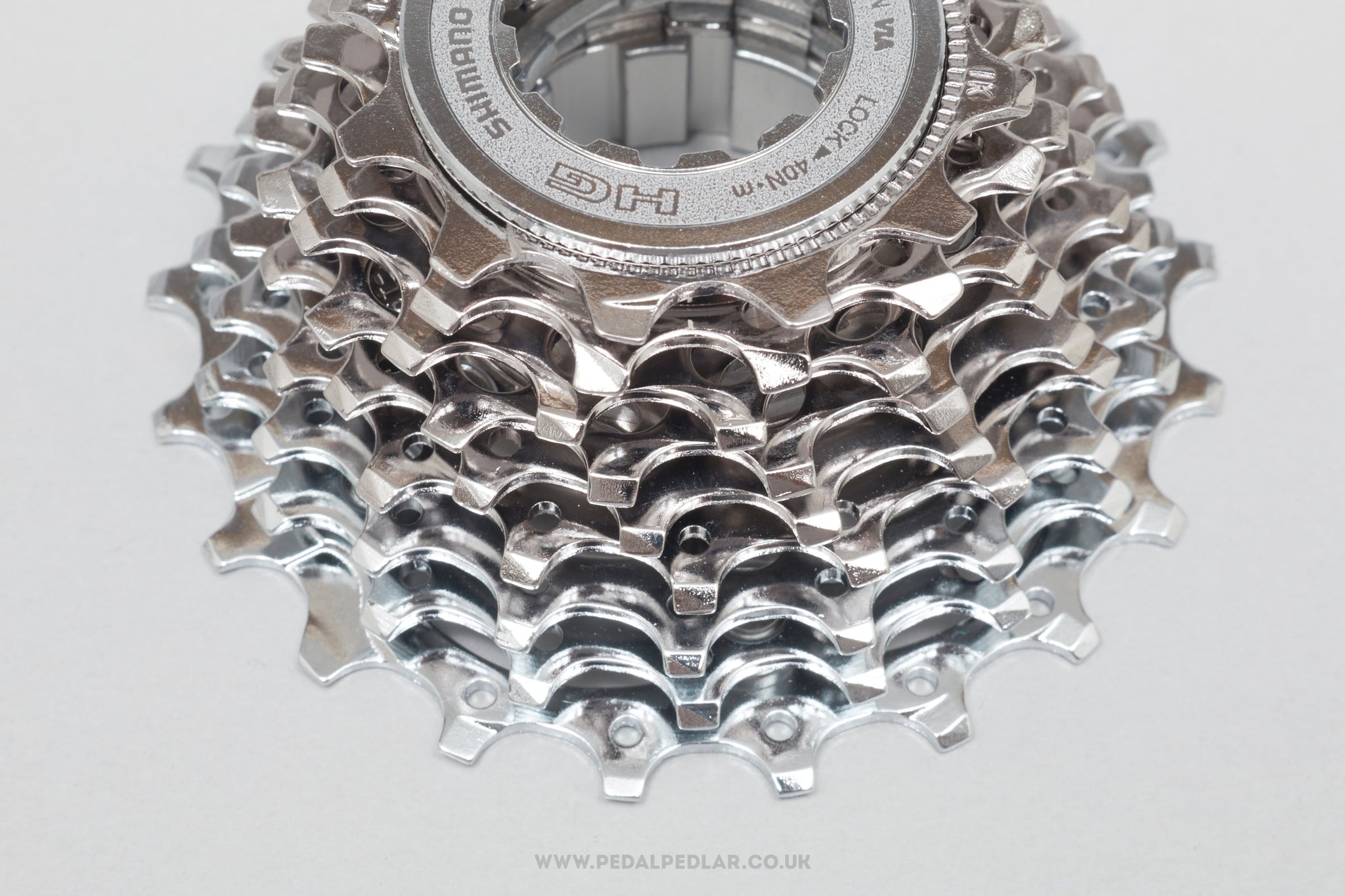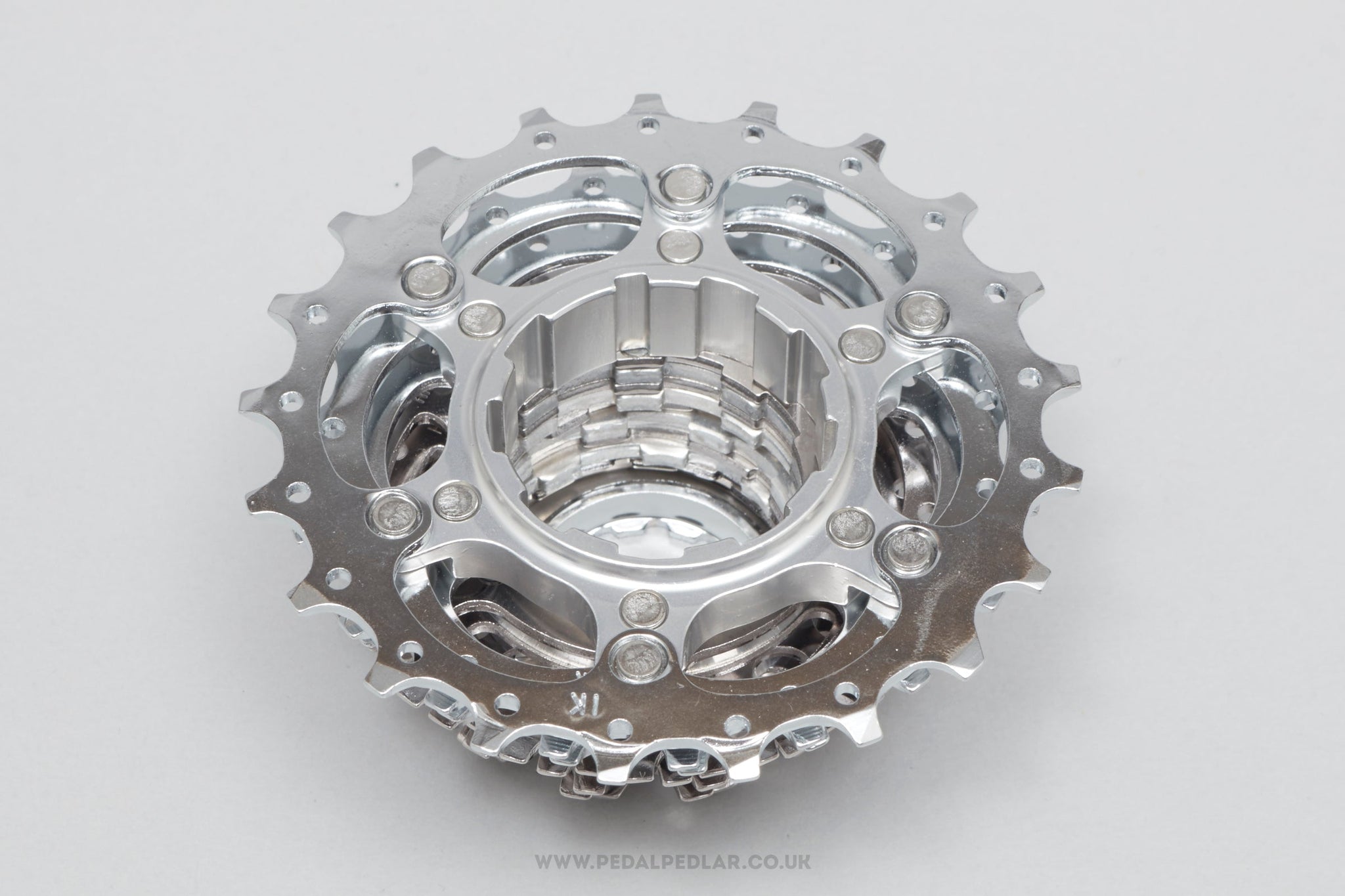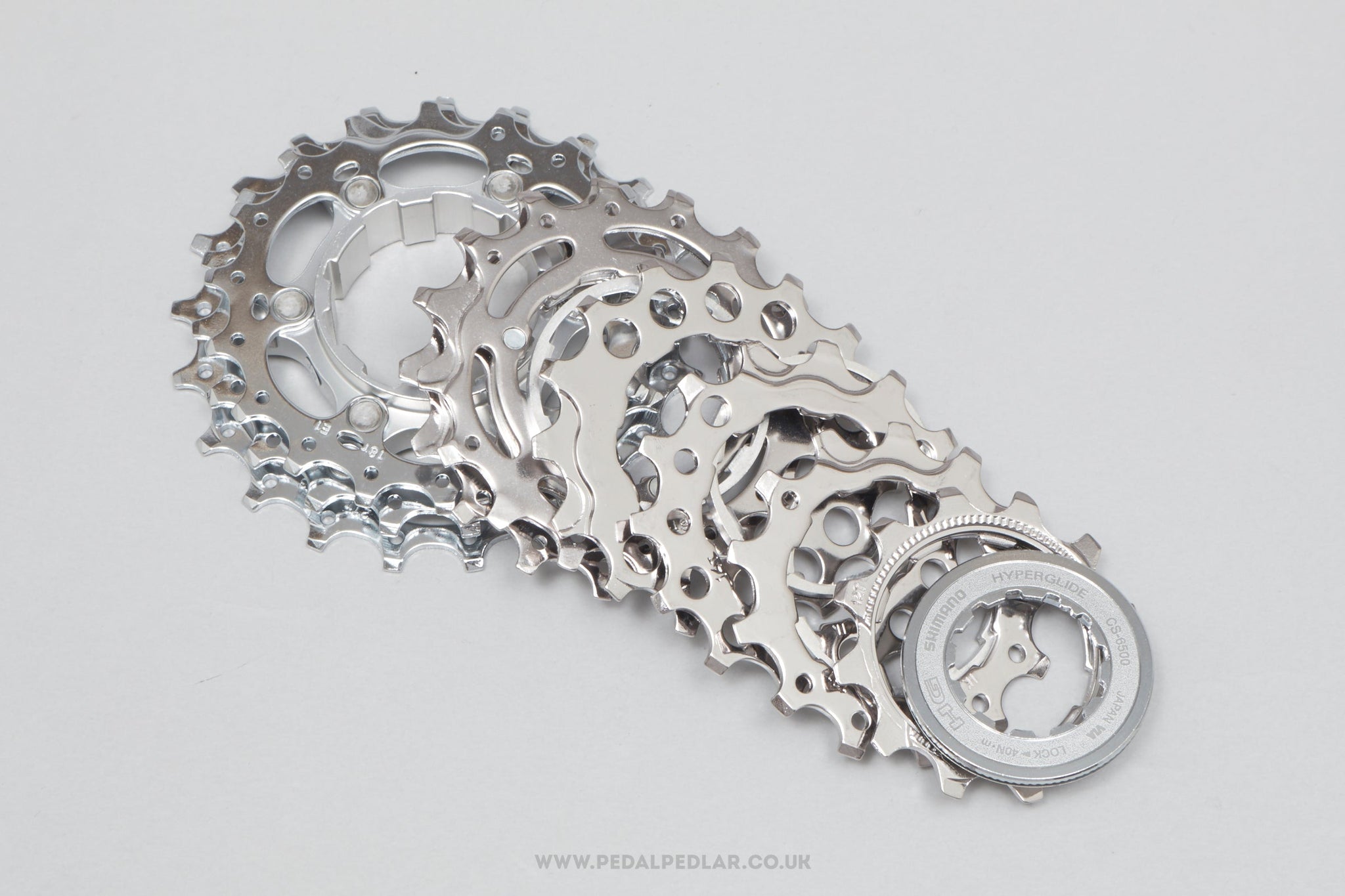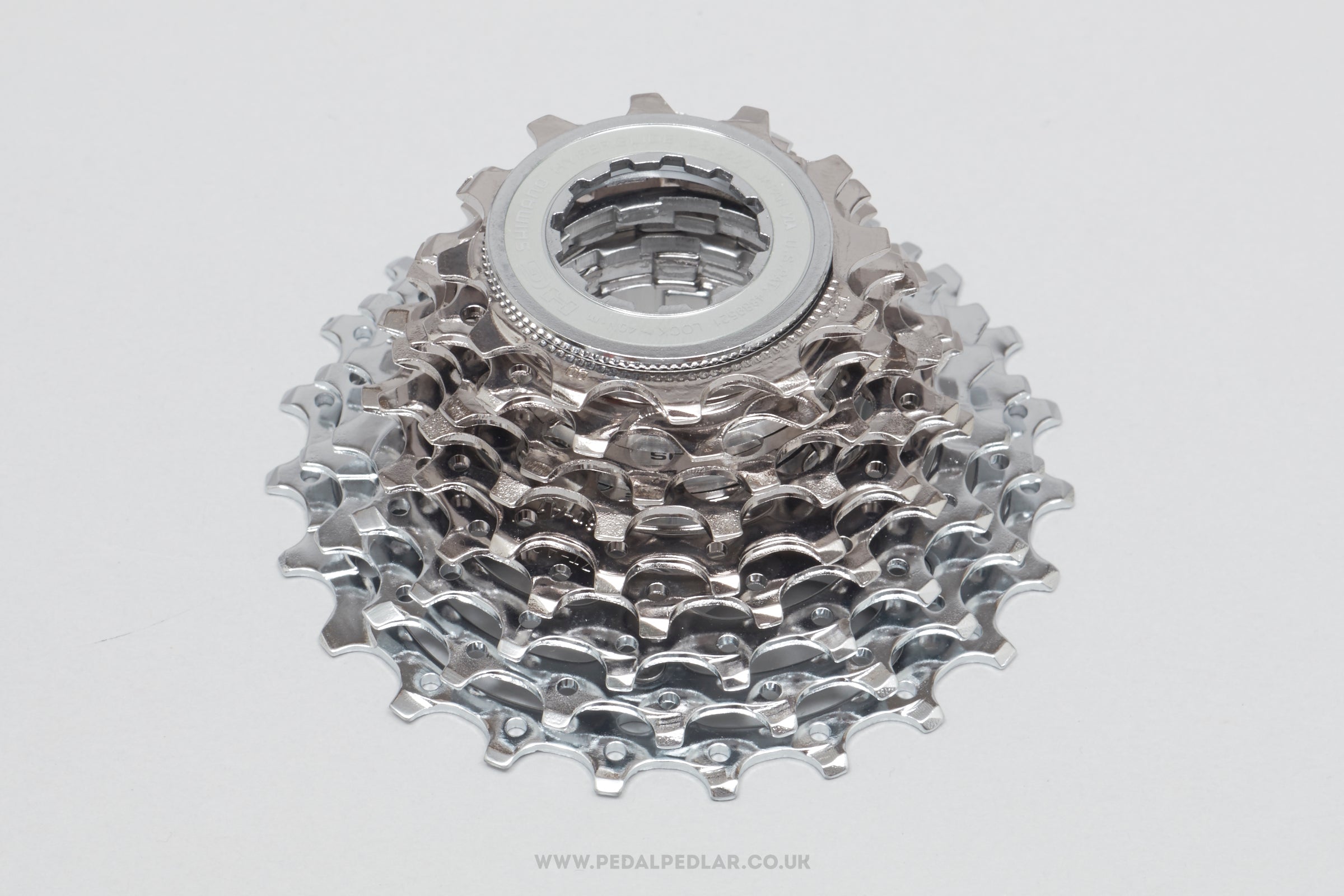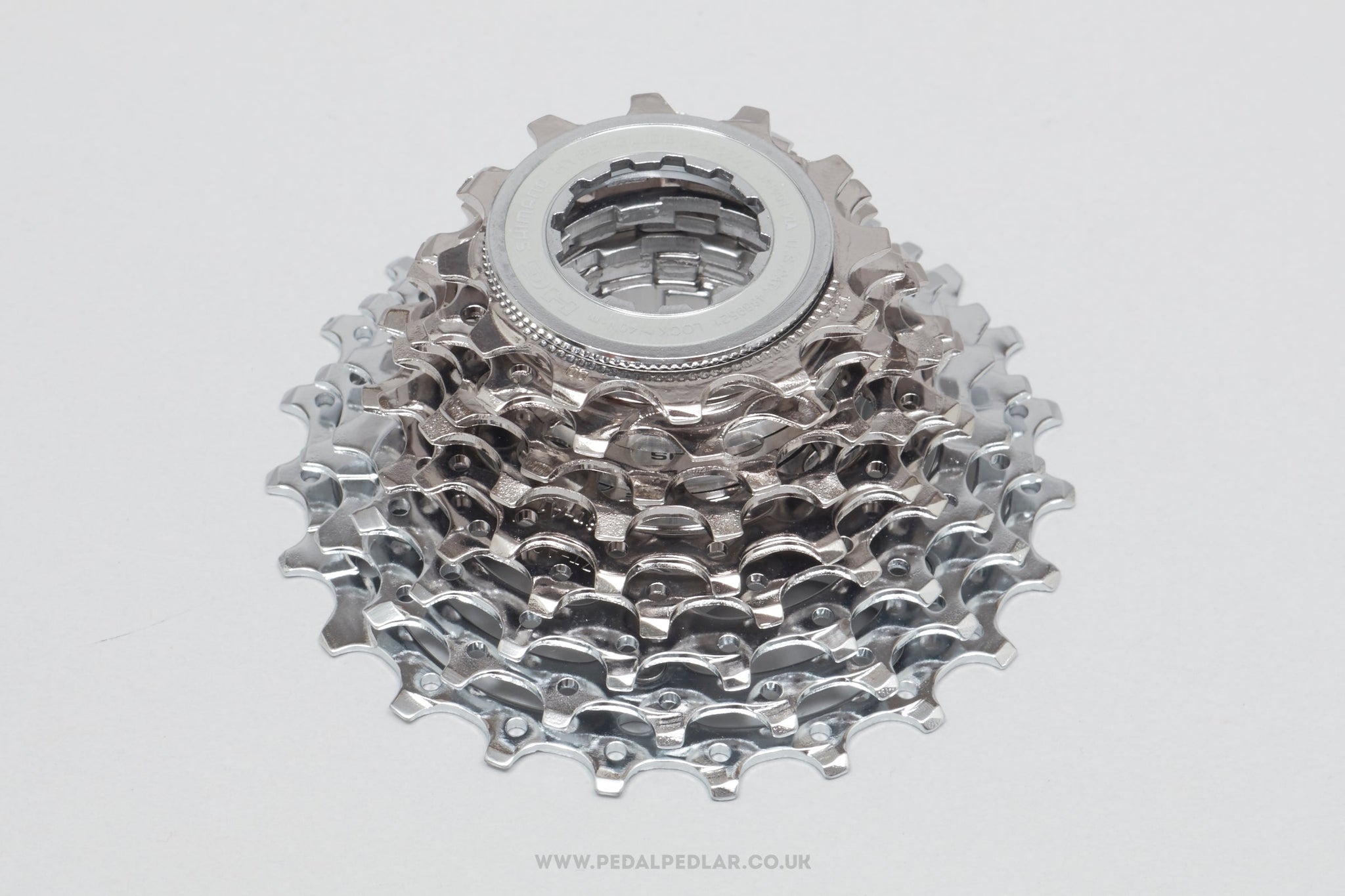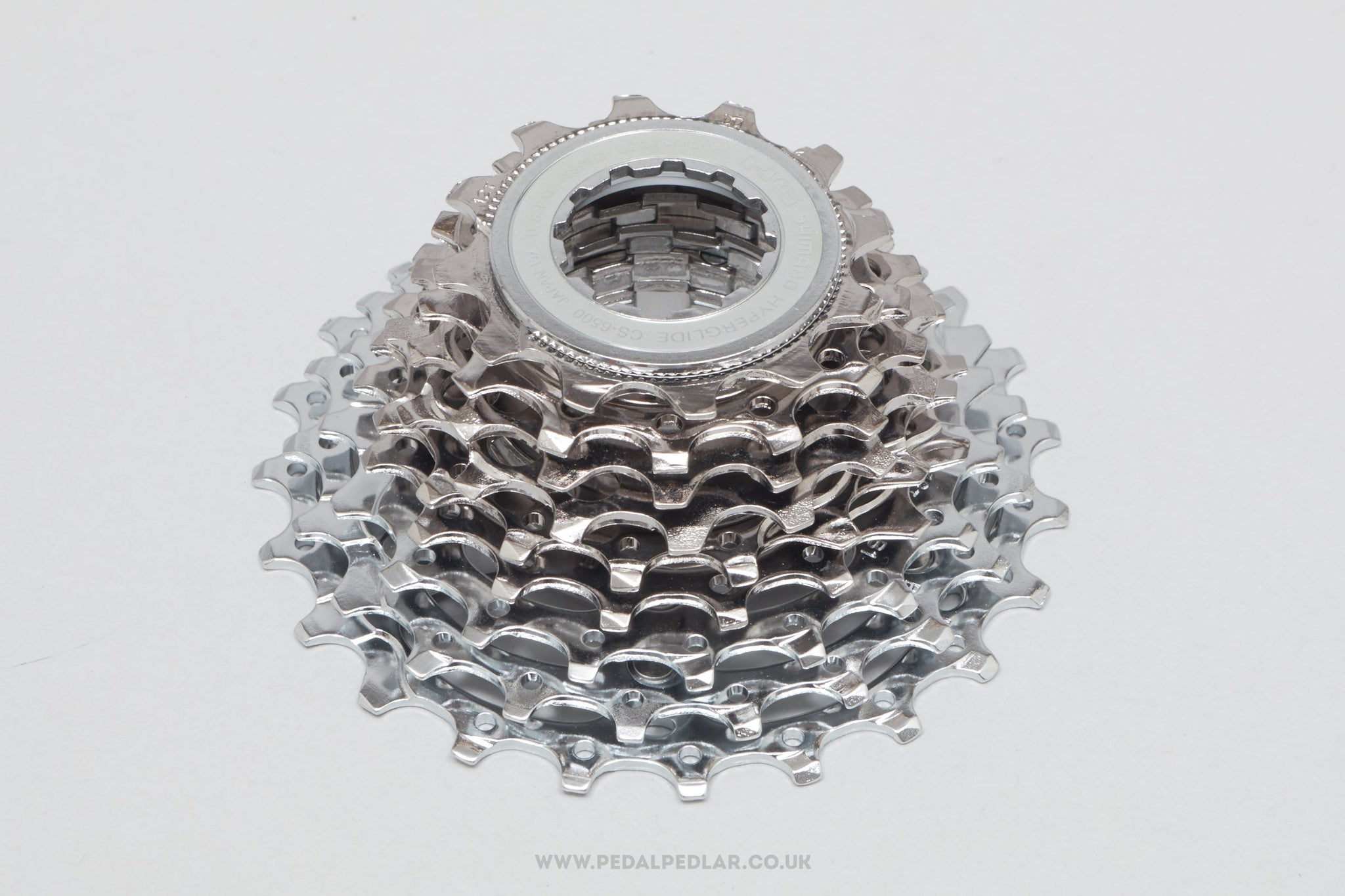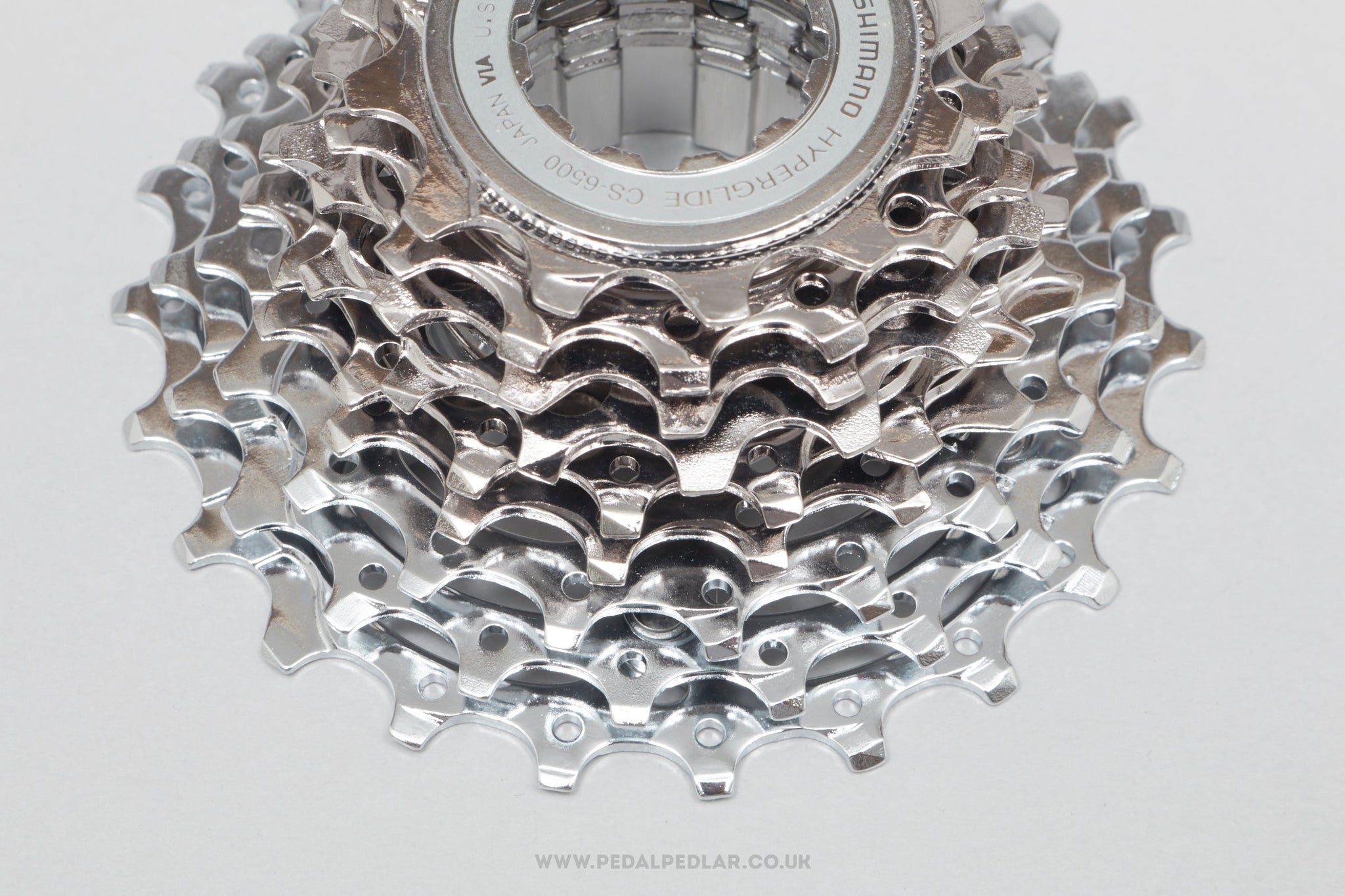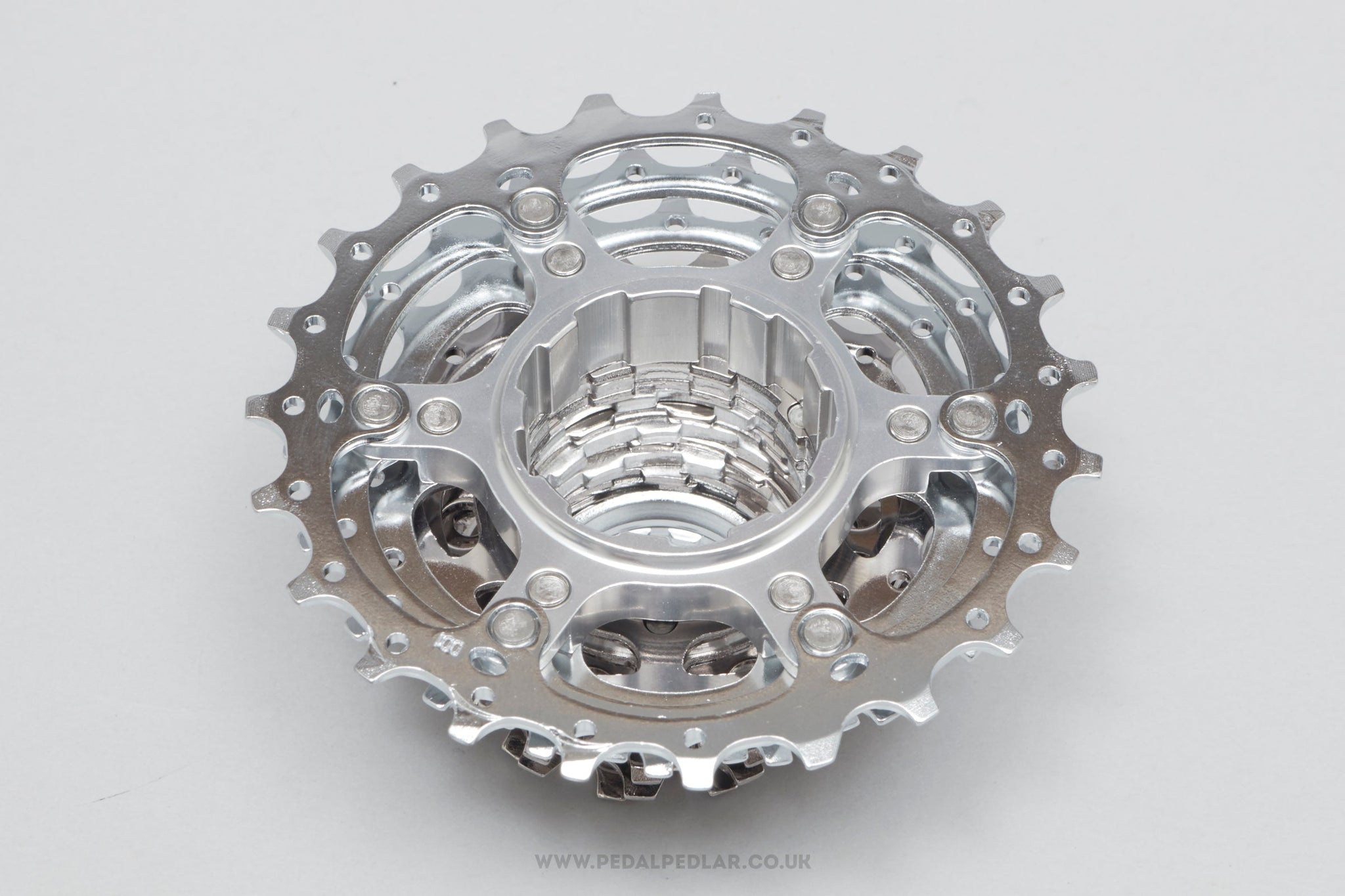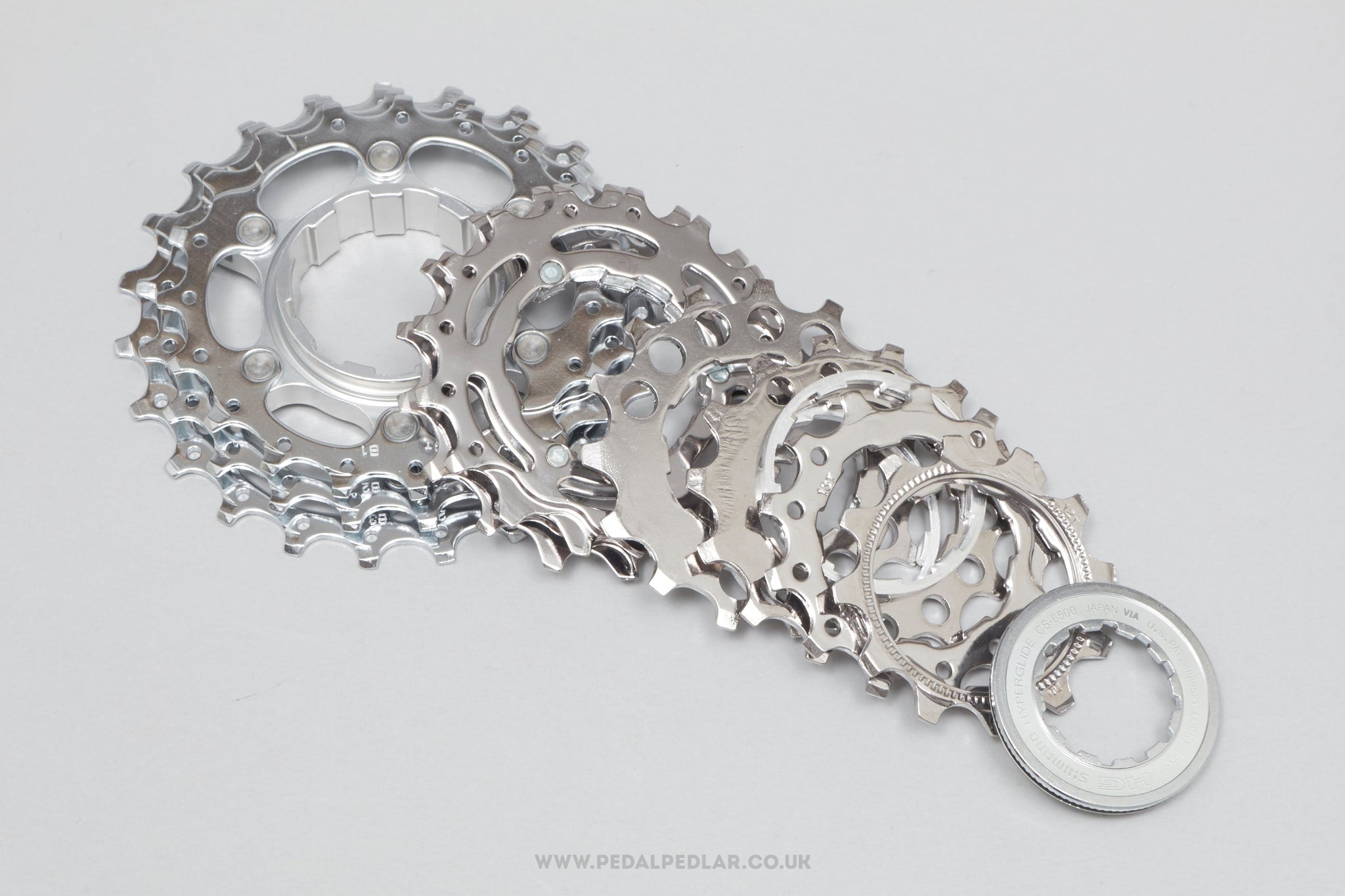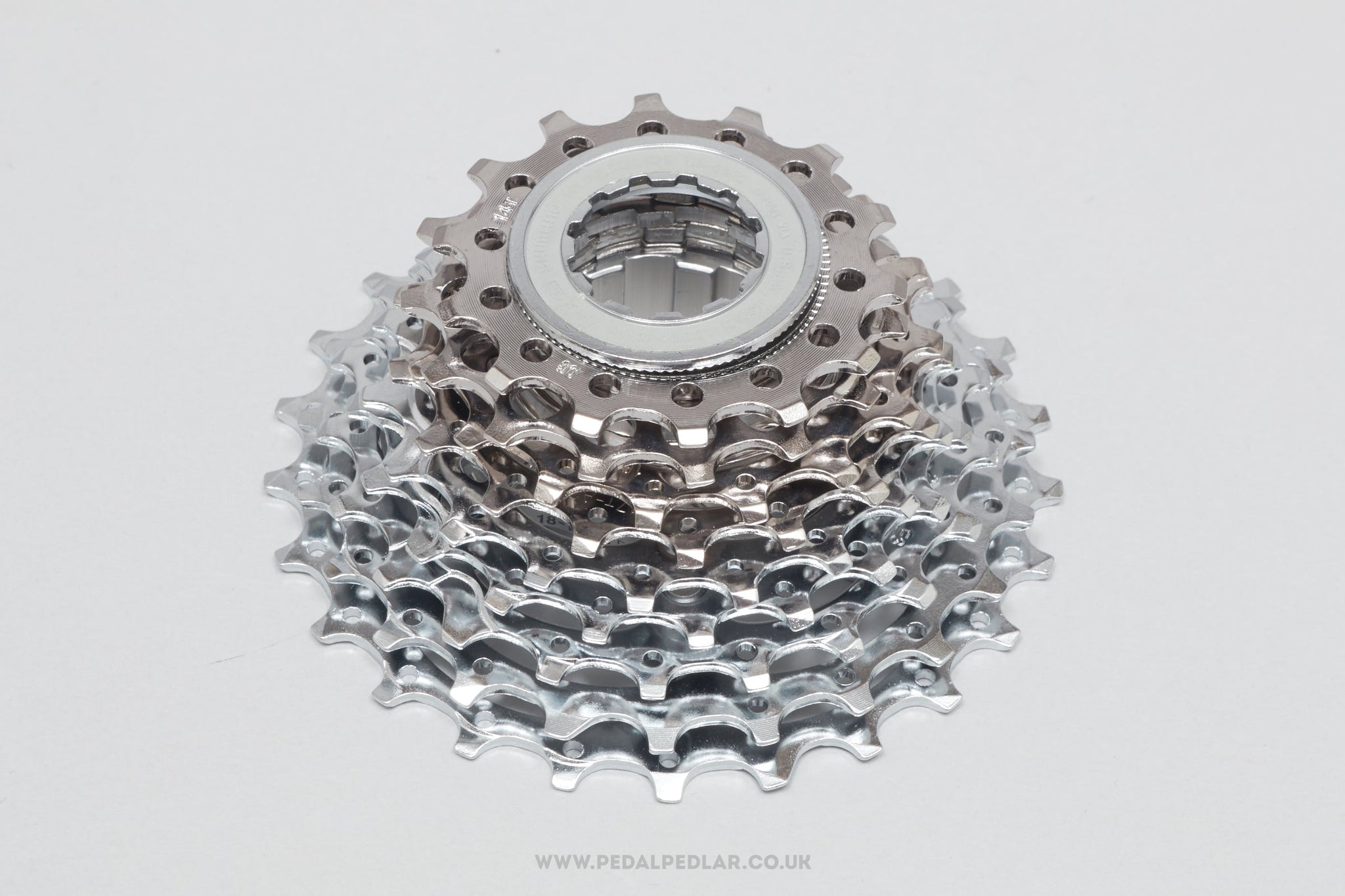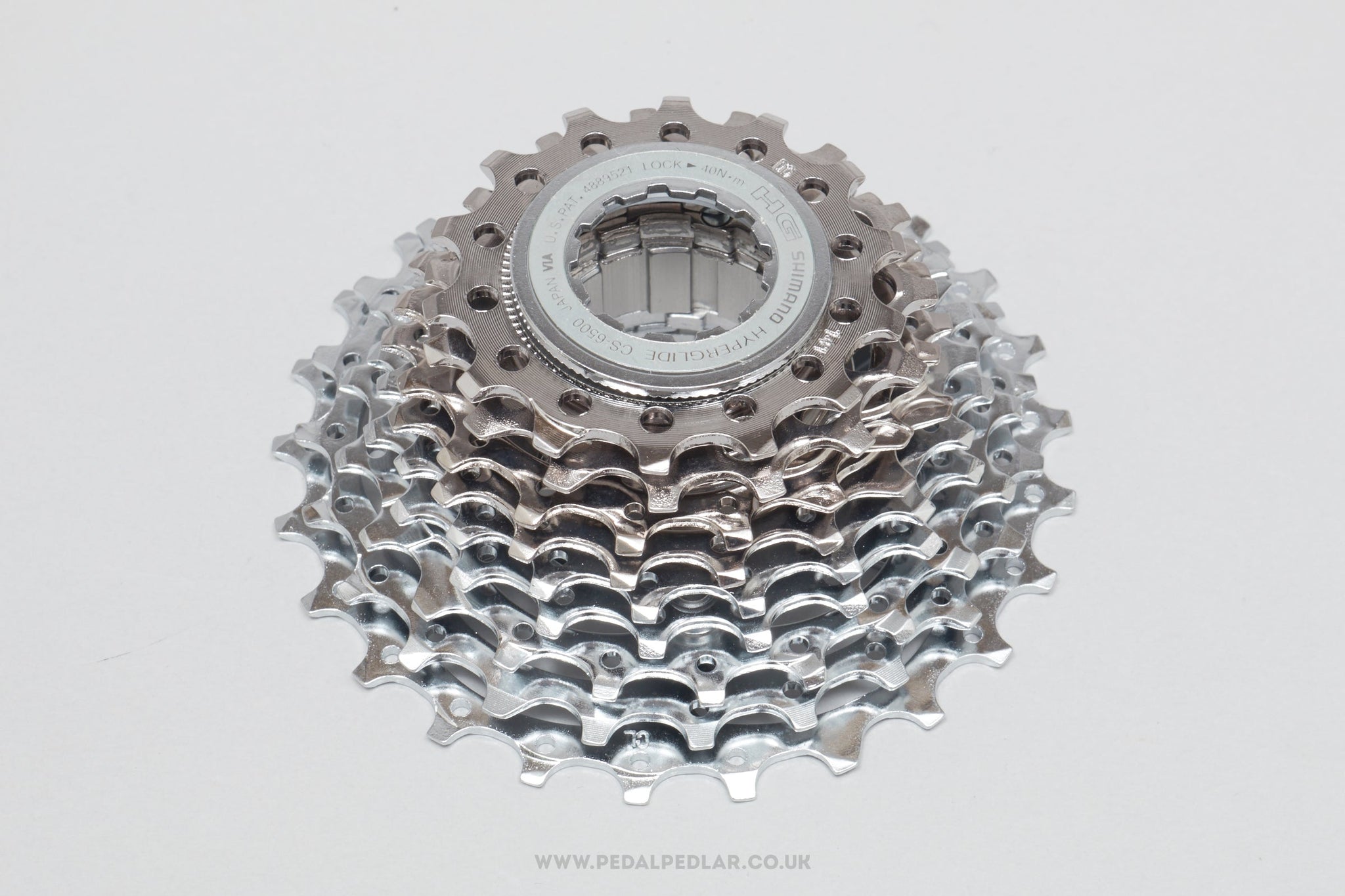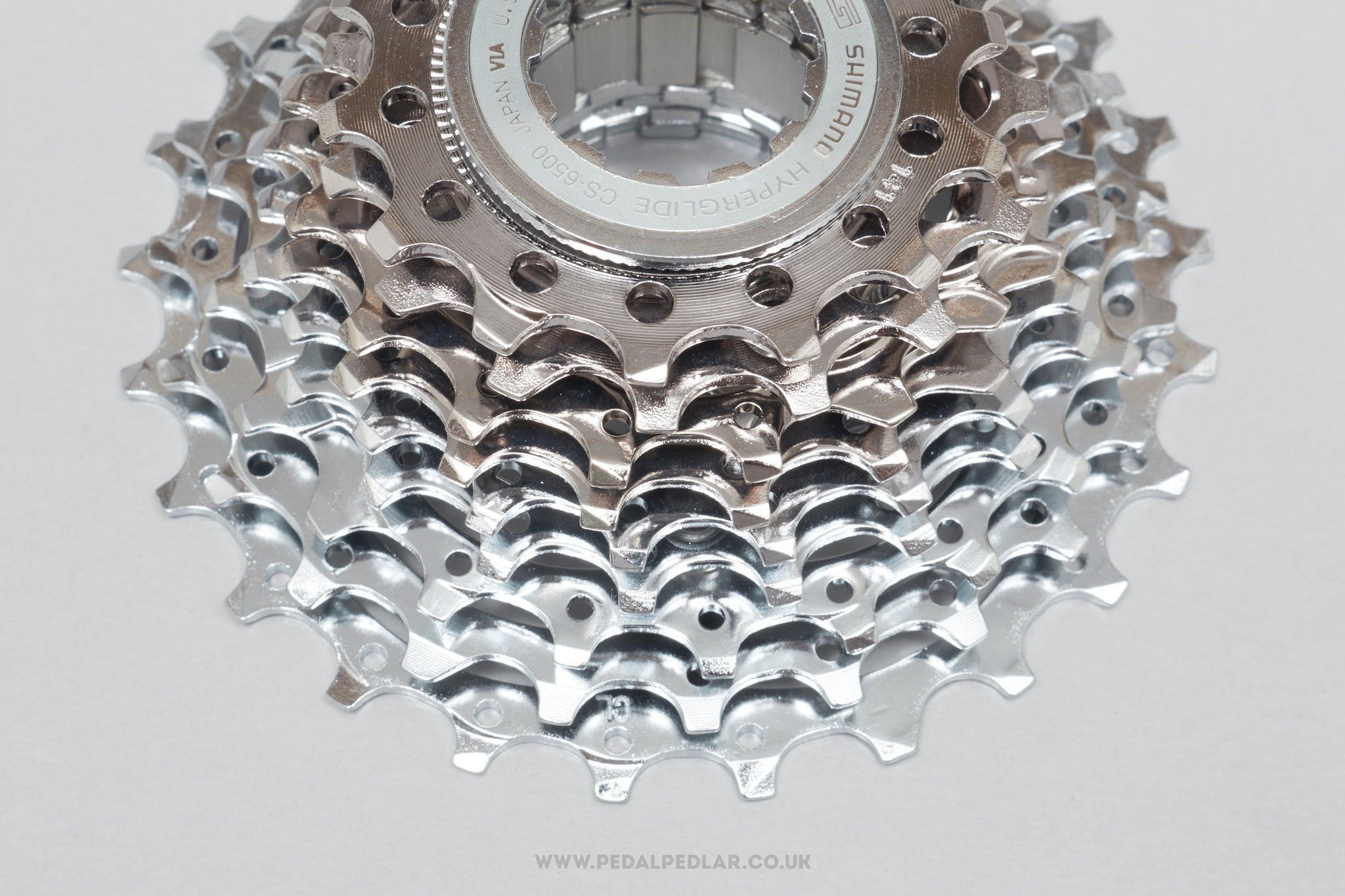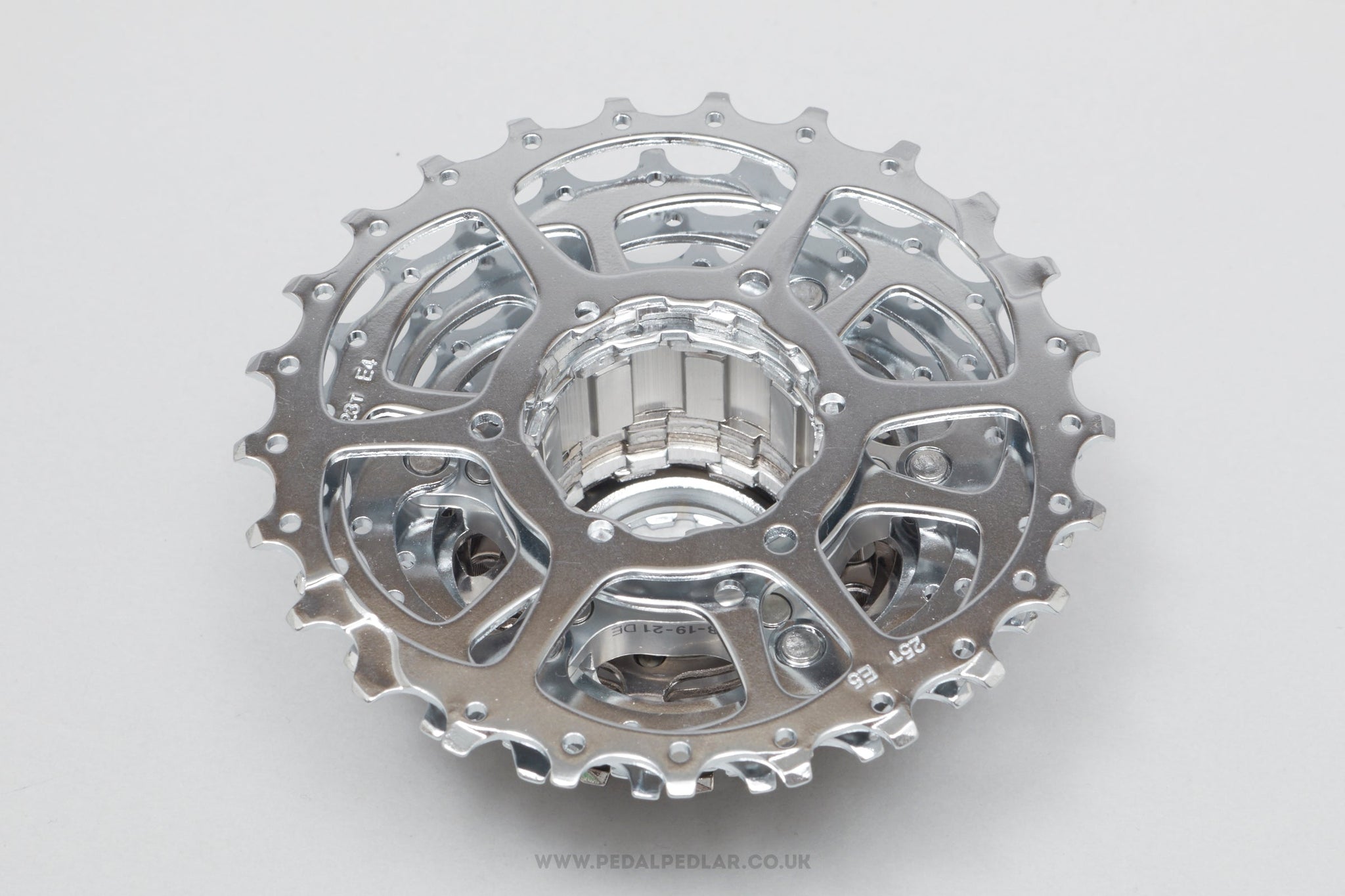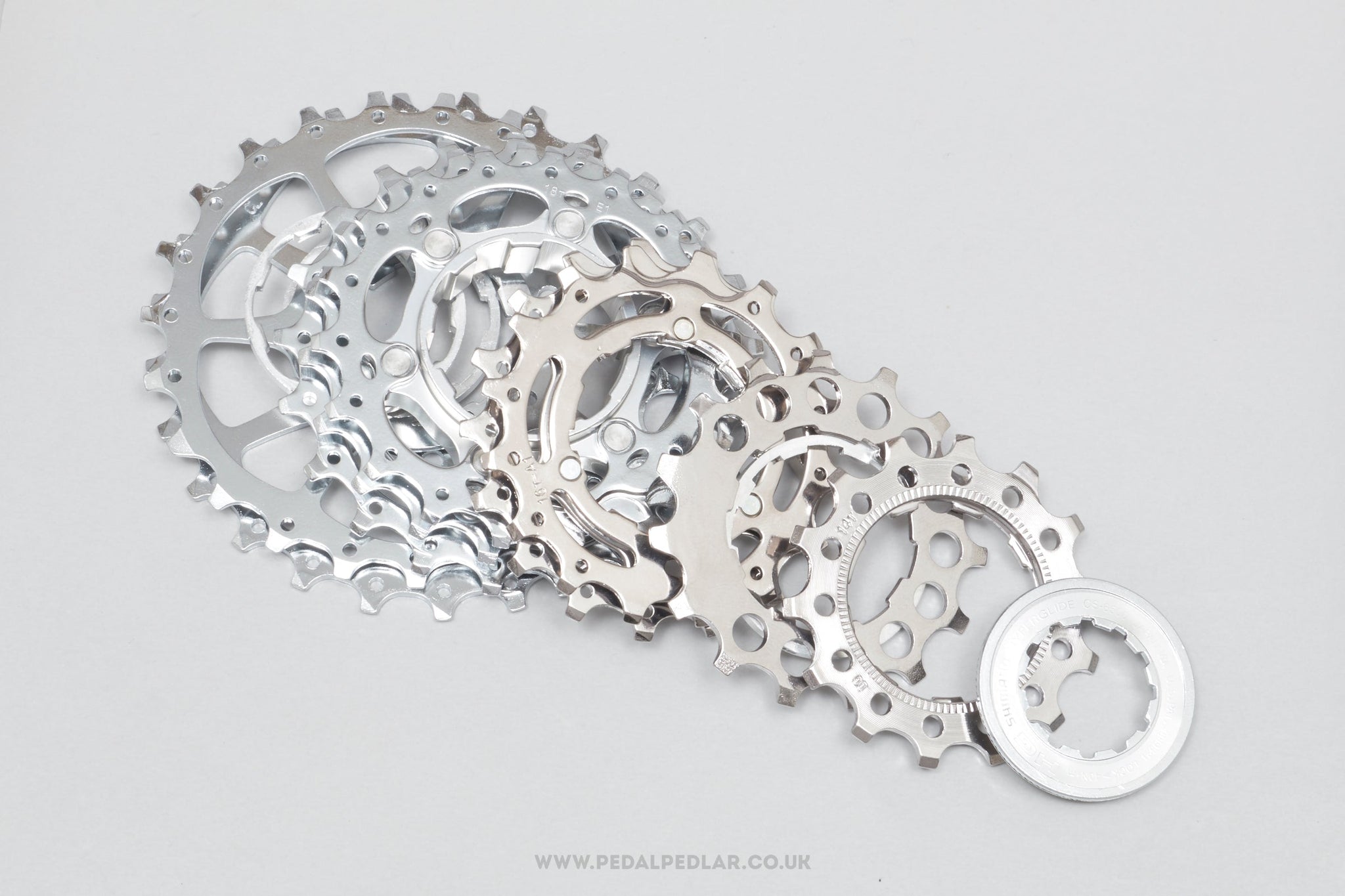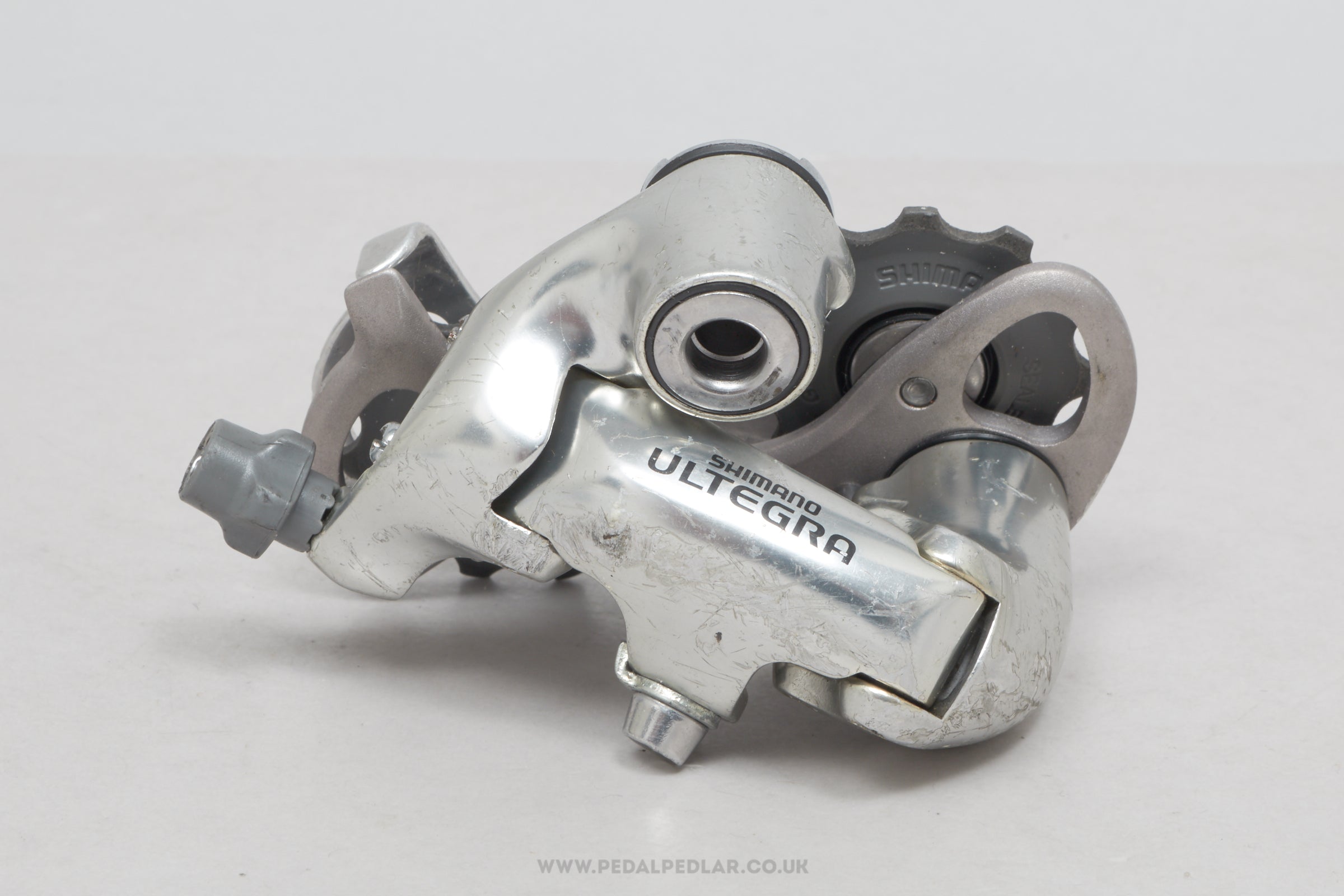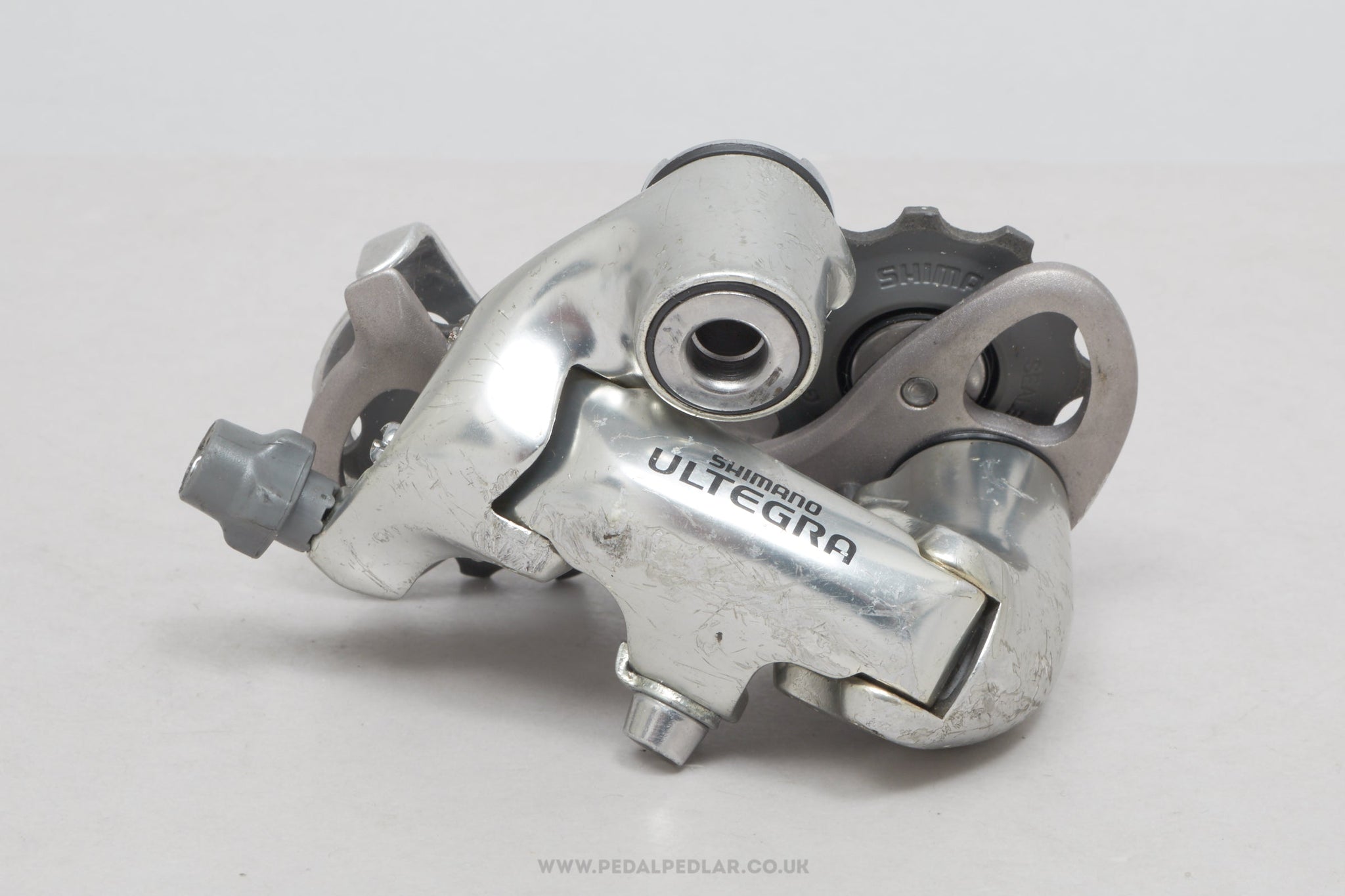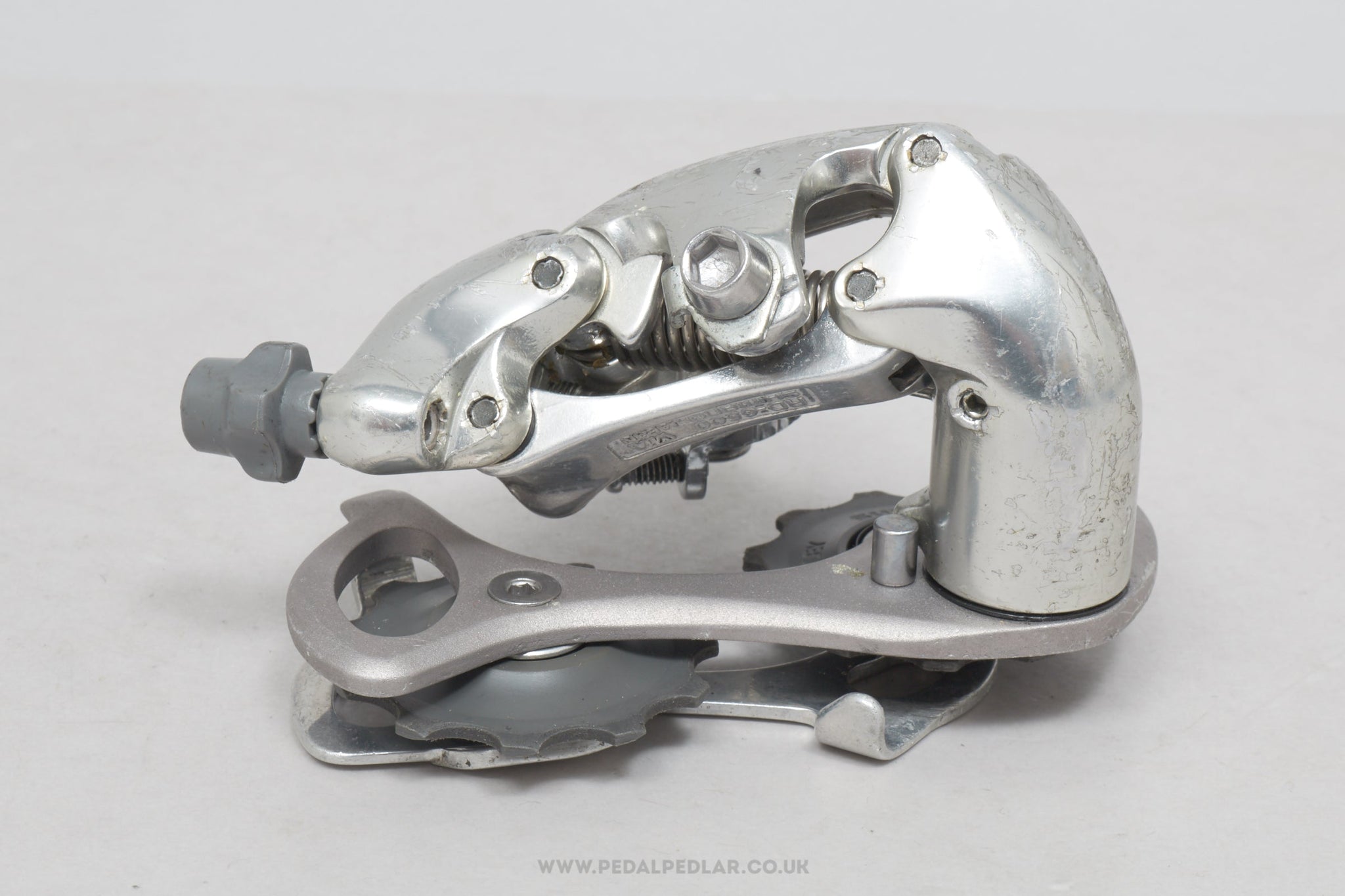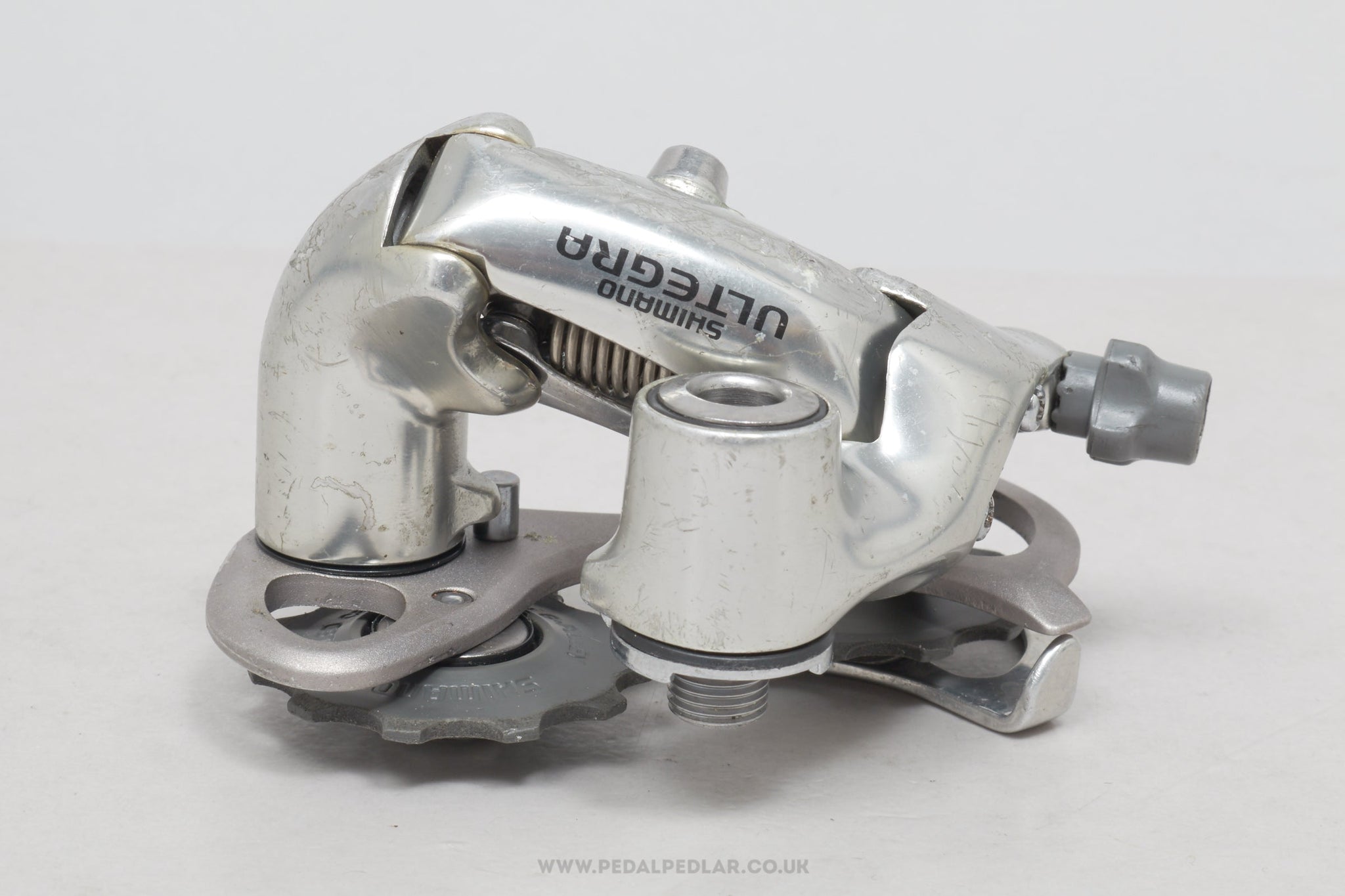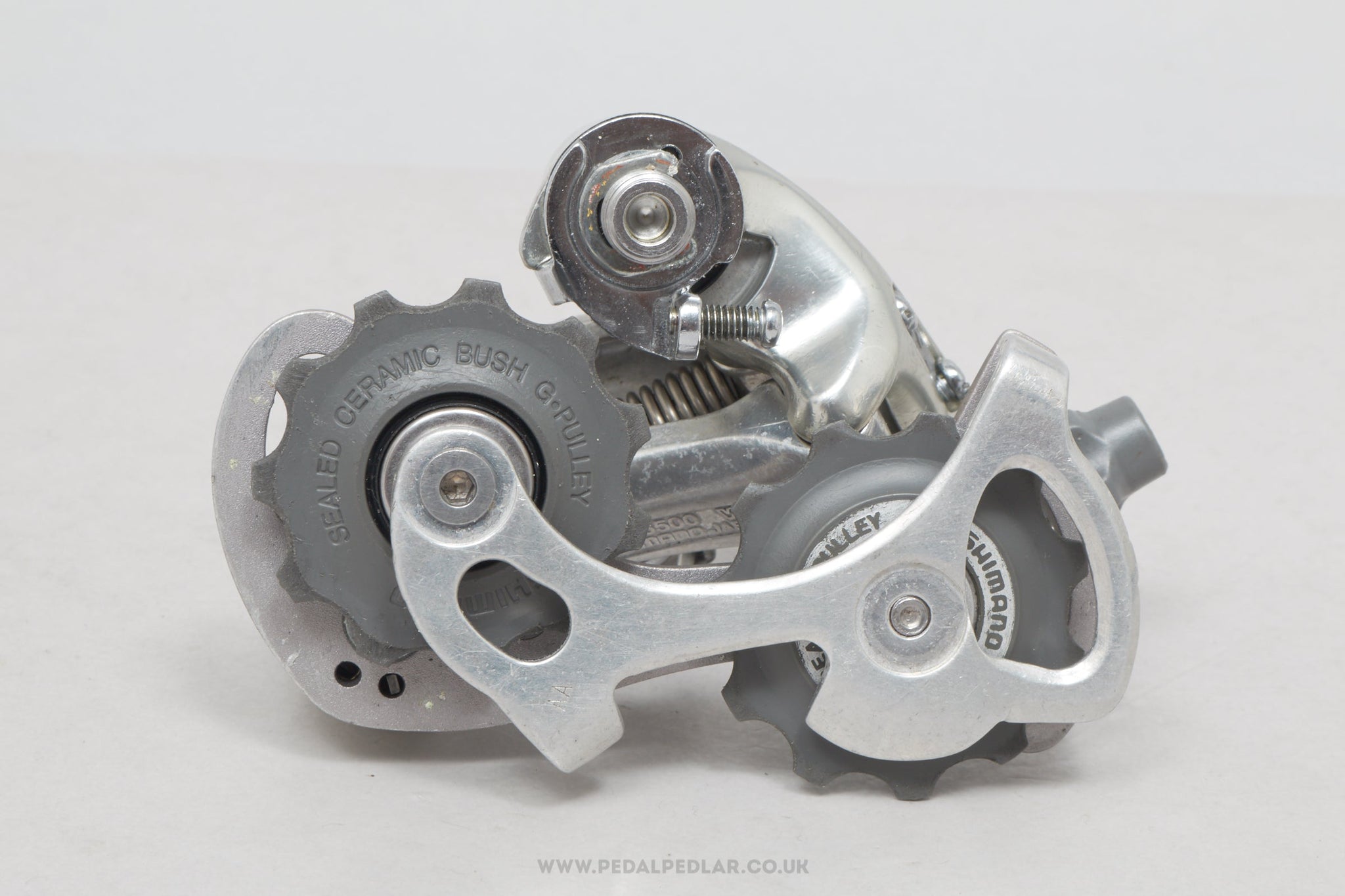- Frames
- Wheels
-
Parts
- Drivetrain & Gearing
- Downtube Shifters
- Bar Shifters
- Shift/Brake Levers
- Front Derailleurs
- Rear Derailleurs
- Chainsets
- Crank Arms
- Crank Parts
- Bottom Brackets
- Bottom Bracket Parts
- Chainrings
- Freewheels
- Cassettes
- Chains
- Gear Parts
- Braking
- Brake Sets
- Brake Calipers
- Brake Cantilevers
- Brake Levers
- Brake Parts
- Clothing
- Accessories
- Journal
Shimano
Shimano 105 (RD-5501) Classic Rear Mech
£35.00
✓ Original part - produced in the 2000s
✓ Lightweight for the era - just 227 grams
✓ Professionally checked & cleaned
✓ Worldwide shipping
Shimano 105 rear mech, hailing from Japan and in production during the 2000s. Made from aluminium/steel and weighing in at 227 grams - pretty lightweight for a rear derailleur at that time. A fine choice for keeping your classic bike authentic, but also great for any other compatible bike too.
The mech's been carefully cleaned, thoroughly checked by one of our mechanics and graded as good condition, but do take a good look at the detailed photos so you can see the cosmetic condition before you buy.OVERVIEW
Jockey Wheel Condition - Very Good
Model ID - RD-5501
Production Era - 2000s
Country - Japanese
Material - Aluminium/Steel
Weight - 227 g
Stock Code - U-RM60C
TECHNICAL INFO
Shifting System - Shimano STI, Shimano SIS, Friction
Speed* - 9 Speed
Max Sprocket Size - 27 Teeth
Max Chain Wrap - 29
Chain Width - 3/32" (Standard)
*See help section.
-
▼SHIPPING, TAXES & RETURNS
-
We've been safely sending orders around the world since 2010. There's a handy shipping calculator on the shopping cart page so you can see the cost of postage as soon as you've added it to your basket. Your order will be carefully packed and sent with tracking & insurance, we despatch most orders within 2-3 days but larger items and orders placed before the weekend can take an extra day or two to process.
We accept returns, please notify us within 14 days and ensure the item arrives back with us no later than 30 days after the order was received.
We don't charge VAT, however, if buying from outside of the UK please remember that there may be import fees to pay directly to the delivery company before receiving the order. Unfortunately we can’t advise on the exact costs as it varies from country to country, so please check your national rates before purchasing.
-
▼HELP SECTION
-
Shifting system - friction means your gear levers don't click when you change gear, when they do click it's referred to as indexed shifting. If you have indexed gear levers they must use the same system as the rear derailleur, if you're using friction levers you can mix and match.
*Speed - the number of cogs at the back the derailleur was designed to be used with. This is important with indexed shifting, but with friction shifters you can in theory run any rear mech with any number of cogs, but you are more likely to have issues running high numbers of cogs with mechs from earlier eras.
Max cog size - the amount of teeth on the largest cog of your freewheel/cassette can be no greater than this to work with this derailleur.
Chain wrap - subtract the size of your smallest rear cog from your biggest, then do the same with your chainrings, add the 2 numbers together and you have your chain wrap.
Chain width - generally speaking, derailleurs designed for more than 3 speed use will fit a standard 3/32'' chain, the exception being some Cyclo & Simplex models from around the mid 1900s.
Shimano Alivio (FC-M4000) NOS Classic Triple Octalink 170 mm MTB Chainset
£65.00
✓ Original part - produced in the 2000s
✓ New old stock! Still unused after all these years
✓ Worldwide shipping
Shimano Alivio chainset (or crankset, if you prefer), hailing from Japan and in production during the 2000s. Made from aluminium/steel and weighing in at 908 grams. A fine choice for keeping your classic bike authentic, but also great for any other compatible bike.
OVERVIEW
Body Condition - New Old Stock*
Chainring Condition - New Old Stock*
Model ID - FC-M4000
Production Era - 2000s
Country - Japanese
Material - Aluminium / Steel
Weight - 908 g
Stock Code - D-CS113C
*New old stock items may have marks from storage over the years, and as we often have multiples they can vary from piece to piece, but they are always genuine new & unused items.
TECHNICAL INFO
Chainring Count - Triple
Tooth Count - 40 / 30 / 22
Bottom Bracket Type - Octalink (V2)
BCD - 96 / 64 BCD
Crank Arm Length - 170 mm
Chain Width - 11/28"
Pedal Threads - Standard (9/16" x 20 TPI)
Intended Speed* - 9 Speed
Bike Type* - MTB
*See help section.
-
▼SHIPPING, TAXES & RETURNS
-
We've been safely sending orders around the world since 2010. There's a handy shipping calculator on the shopping cart page so you can see the cost of postage as soon as you've added it to your basket. Your order will be carefully packed and sent with tracking & insurance, we despatch most orders within 2-3 days but larger items and orders placed before the weekend can take an extra day or two to process.
We accept returns, please notify us within 14 days and ensure the item arrives back with us no later than 30 days after the order was received.
We don't charge VAT, however, if buying from outside of the UK please remember that there may be import fees to pay directly to the delivery company before receiving the order. Unfortunately we can’t advise on the exact costs as it varies from country to country, so please check your national rates before purchasing.
-
▼HELP SECTION
-
Chainring Count - the number of chainrings on the chainset. Fixed gear track bikes, single-speeds and some geared bikes use a single chainring, road bikes commonly use a double (two rings) and most touring bikes and mountain bikes will use a triple chainset (three rings).
Tooth Count - the number of teeth on the chainring(s), the higher the number the harder the gear.
Bottom Bracket Type - ‘square taper’, as the name suggests have a square shaped axle that slots into the chainset and ‘cottered’ axles are round and secured by pins - pretty much every bike up until the 1990s would use one of these, cottered being the much earlier system. Since then, different manufacturers have introduced their own systems that are not interchangeable so you must use a chainset that matches.
BCD - stands for Bolt Circle Diameter (sometimes referred to as PCD - Pitch Circle Diameter) and is only really needed when changing chainrings. To calculate the BCD, measure the distance in millimeters from the centre of any chainring bolt to the centre of an adjacent one and multiply it by 1.709 (you’ll likely need to round the resulting number up or down a little to get your BCD measurement).
Crank Arm Length - this is measured from the absolute centre of the bottom bracket hole to the centre of the hole for the pedal.
Chain Width - this is mostly only relevant for chainsets with a single chainring - if this is ⅛” then you must use a ⅛” chain. Almost all double and triple (and some single) ring chainsets will use a standard 3/32” chain, the only exception being old chainsets designed for 3 or 4 speed freewheels.
Pedal Threads - this must match the thread of your pedals and is usually stamped on the pedals themselves, most bikes use a standard thread of 9/16” x 20 tpi. The exceptions being older French bikes, bikes with cheaper one-piece type chainsets and Shimano’s Dyna Drive system (easily identifiable as the pedal holes are about an inch wide!).
*Intended Speed - the number of cogs at the back the chainset was designed to be used with. We refer to it as ‘intended’ speed as most double and triple chainsets will actually work with different speeds than originally intended, but the further away you get from the intended speed the more likely you are to experience minor setup issues. The exception being some chainsets intended for 10 speed use or higher, with these it’s better to stick to the intended speed.
*Bike Type - this is just a guide, any chainset can technically be used on any bike as long as everything's compatible.
Shimano Deore LX (ST-M580) NOS Classic 9 Speed Rapidfire Trigger Shift/Brake Levers
£85.00
✓ Original shifters - produced in the 2000s
✓ New old stock! Still unused after all these years
✓ Worldwide shipping
Shimano Deore LX shift/brake levers, hailing from Japan and in production during the 2000s. Made from aluminium and weighing in at 469 grams. A fine choice for keeping your classic bike authentic, but also great for any other compatible bike.
OVERVIEW
Model ID - ST-M580
Production Era - 2000s
Country - Japanese
Material - Aluminium
Weight - 469 g
Stock Code - D-G2-S-L24C
*New old stock items may have marks from storage over the years, and as we often have multiples they can vary from piece to piece, but they are always genuine new & unused items.
TECHNICAL INFO
Speed - 9 Speed
Shift System - Rapidfire (Standard 2:1 Shift Ratio)
Shifter Type - Trigger
Chainset Compatibility - 3x (Triple)
Brake Type - V-Brakes
-
▼SHIPPING, TAXES & RETURNS
-
We've been safely sending orders around the world since 2010. There's a handy shipping calculator on the shopping cart page so you can see the cost of postage as soon as you've added it to your basket. Your order will be carefully packed and sent with tracking & insurance, we despatch most orders within 2-3 days but larger items and orders placed before the weekend can take an extra day or two to process.
We accept returns, please notify us within 14 days and ensure the item arrives back with us no later than 30 days after the order was received.
We don't charge VAT, however, if buying from outside of the UK please remember that there may be import fees to pay directly to the delivery company before receiving the order. Unfortunately we can’t advise on the exact costs as it varies from country to country, so please check your national rates before purchasing.
-
▼SAFETY & COMPLIANCE
- This product complies with the EU General Product Safety Regulation (GPSR). Professional installation and regular inspections are strongly recommended. Due to the product's age, extra care should be taken during use.
Product Manufacturer - Shimano Inc. 3-77 Oimatsu-cho, Sakai-ku, Sakai-shi, Osaka 590-8577, Japan
EU Authorised Representative - Global Trade Department NI Ltd, Office 834, Unit 6, 100 Lisburn Road, Belfast BT9 6AG, Northern Ireland
-
▼HELP SECTION
-
Speed - the number of cogs at the back the right shifter is designed to be used with. This is important with indexed shifting but with friction setups you can in theory run any shifters with any speed setup.
Shift System - friction shifters don't click into gear when you change, when they do click it's referred to as indexed shifting, for this to work correctly you must use the same shift system as your rear derailleur.
Shifter Type - brifters' are designed to be used on road drop type handlebars and 'trigger' shifters are designed to be used on flat bars, usually for mountain bikes.
Chainset Compatibility - the number of rings on the chainset the left shifter is capable of working with (providing the front derailleur is capable of the same).
Brake Type - if you’re running direct pull cantilevers (V-Brakes), you’ll need compatible shift/brake levers. For traditional side pull calipers, cantilevers and mini V-brakes you’ll need shift/brake levers designed to be used with these as the cable pull is different.
Shimano Ultegra (CS-6500) NOS Classic 9 Speed Hyperglide 12-21 Cassette
£85.00
✓ Original part - produced in the 2000s
✓ New old stock! Still unused after all these years
✓ Worldwide shipping
Shimano Ultegra cassette, hailing from Japan and in production during the 2000s. Made from steel/aluminium and weighing in at 204 grams. A fine choice for keeping your classic bike authentic, but also great for any other compatible bike too.
OVERVIEW
Model ID - CS-6500
Production Era - 2000s
Country - Japanese
Material - Steel / Aluminium
Weight - 204 g
Stock Code - D-CAS43C
*New old stock items may have marks from storage over the years, and as we often have multiples they can vary from piece to piece, but they are always genuine new & unused items.
TECHNICAL INFO
Speed - 9 Speed
Spline Pattern - Shimano Hyperglide
Range - 12-21
-
▼SHIPPING, TAXES & RETURNS
-
We've been safely sending orders around the world since 2010. There's a handy shipping calculator on the shopping cart page so you can see the cost of postage as soon as you've added it to your basket. Your order will be carefully packed and sent with tracking & insurance, we despatch most orders within 2-3 days but larger items and orders placed before the weekend can take an extra day or two to process.
We accept returns, please notify us within 14 days and ensure the item arrives back with us no later than 30 days after the order was received.
We don't charge VAT, however, if buying from outside of the UK please remember that there may be import fees to pay directly to the delivery company before receiving the order. Unfortunately we can’t advise on the exact costs as it varies from country to country, so please check your national rates before purchasing.
-
▼HELP SECTION
-
Speed - the number of cogs on the cassette.
Spline Pattern - the shape of the cogs where they slide on to the freehub body, this must match the spline pattern of your hub to able to fit. In the 1980s Shimano introduced Uniglide cassettes that share the same spline pattern as their now standard Hyperglide, but the smallest sprocket threads on to the hub to secure it rather than using a conventional lockring, these will only fit hubs with a threaded section on the outside of the freehub body.
Range - the number of teeth on the smalles and largest cogs, this gives you an indication of how hard or easy the gearing will be, the lower the number the harder the gears. The tooth count of the cogs inbetween are usually evenly spaced, ie: a 6 speed 14-24 freewheel would likely have cog sizes 14, 16, 18, 20, 22 & 24.
Shimano Ultegra (CS-6500) NOS Classic 9 Speed Hyperglide 12-23 Cassette
£75.00
✓ Original part - produced in the 2000s
✓ New old stock! Still unused after all these years
✓ Worldwide shipping
Shimano Ultegra cassette, hailing from Japan and in production during the 2000s. Made from steel/aluminium and weighing in at 210 grams. A fine choice for keeping your classic bike authentic, but also great for any other compatible bike too.
OVERVIEW
Model ID - CS-6500
Production Era - 2000s
Country - Japanese
Material - Steel / Aluminium
Weight - 210 g
Stock Code - D-CAS44C
*New old stock items may have marks from storage over the years, and as we often have multiples they can vary from piece to piece, but they are always genuine new & unused items.
TECHNICAL INFO
Speed - 9 Speed
Spline Pattern - Shimano Hyperglide
Range - 12-23
-
▼SHIPPING, TAXES & RETURNS
-
We've been safely sending orders around the world since 2010. There's a handy shipping calculator on the shopping cart page so you can see the cost of postage as soon as you've added it to your basket. Your order will be carefully packed and sent with tracking & insurance, we despatch most orders within 2-3 days but larger items and orders placed before the weekend can take an extra day or two to process.
We accept returns, please notify us within 14 days and ensure the item arrives back with us no later than 30 days after the order was received.
We don't charge VAT, however, if buying from outside of the UK please remember that there may be import fees to pay directly to the delivery company before receiving the order. Unfortunately we can’t advise on the exact costs as it varies from country to country, so please check your national rates before purchasing.
-
▼HELP SECTION
-
Speed - the number of cogs on the cassette.
Spline Pattern - the shape of the cogs where they slide on to the freehub body, this must match the spline pattern of your hub to able to fit. In the 1980s Shimano introduced Uniglide cassettes that share the same spline pattern as their now standard Hyperglide, but the smallest sprocket threads on to the hub to secure it rather than using a conventional lockring, these will only fit hubs with a threaded section on the outside of the freehub body.
Range - the number of teeth on the smalles and largest cogs, this gives you an indication of how hard or easy the gearing will be, the lower the number the harder the gears. The tooth count of the cogs inbetween are usually evenly spaced, ie: a 6 speed 14-24 freewheel would likely have cog sizes 14, 16, 18, 20, 22 & 24.
Shimano Ultegra (CS-6500) NOS Classic 9 Speed Hyperglide 14-25 Cassette
£80.00
✓ Original part - produced in the 2000s
✓ New old stock! Still unused after all these years
✓ Worldwide shipping
Shimano Ultegra cassette, hailing from Japan and in production during the 2000s. Made from steel/aluminium and weighing in at 260 grams. A fine choice for keeping your classic bike authentic, but also great for any other compatible bike too.
OVERVIEW
Model ID - CS-6500
Production Era - 2000s
Country - Japanese
Material - Steel / Aluminium
Weight - 260 g
Stock Code - D-CAS45C
*New old stock items may have marks from storage over the years, and as we often have multiples they can vary from piece to piece, but they are always genuine new & unused items.
TECHNICAL INFO
Speed - 9 Speed
Spline Pattern - Shimano Hyperglide
Range - 14-25
-
▼SHIPPING, TAXES & RETURNS
-
We've been safely sending orders around the world since 2010. There's a handy shipping calculator on the shopping cart page so you can see the cost of postage as soon as you've added it to your basket. Your order will be carefully packed and sent with tracking & insurance, we despatch most orders within 2-3 days but larger items and orders placed before the weekend can take an extra day or two to process.
We accept returns, please notify us within 14 days and ensure the item arrives back with us no later than 30 days after the order was received.
We don't charge VAT, however, if buying from outside of the UK please remember that there may be import fees to pay directly to the delivery company before receiving the order. Unfortunately we can’t advise on the exact costs as it varies from country to country, so please check your national rates before purchasing.
-
▼HELP SECTION
-
Speed - the number of cogs on the cassette.
Spline Pattern - the shape of the cogs where they slide on to the freehub body, this must match the spline pattern of your hub to able to fit. In the 1980s Shimano introduced Uniglide cassettes that share the same spline pattern as their now standard Hyperglide, but the smallest sprocket threads on to the hub to secure it rather than using a conventional lockring, these will only fit hubs with a threaded section on the outside of the freehub body.
Range - the number of teeth on the smalles and largest cogs, this gives you an indication of how hard or easy the gearing will be, the lower the number the harder the gears. The tooth count of the cogs inbetween are usually evenly spaced, ie: a 6 speed 14-24 freewheel would likely have cog sizes 14, 16, 18, 20, 22 & 24.
Shimano Ultegra (RD-6500) c.2002 Classic Rear Mech
£90.00
✓ Original part - produced in the 2000s
✓ Lightweight for the era - just 218 grams
✓ Professionally checked & cleaned
✓ Worldwide shipping
Shimano Ultegra rear mech, hailing from Japan and dating back to 2002. Made from aluminium/steel and weighing in at 218 grams - pretty lightweight for a rear derailleur at that time. A fine choice for keeping your classic bike authentic, but also great for any other compatible bike too.
The mech's been carefully cleaned, thoroughly checked by one of our mechanics and graded as good condition, but do take a good look at the detailed photos so you can see the cosmetic condition before you buy.OVERVIEW
Jockey Wheel Condition - Very Good
Model ID - RD-6500
Production Era - 2000s
Country - Japanese
Material - Aluminium/Steel
Weight - 218 g
Stock Code - U-RM80C
TECHNICAL INFO
Shifting System - Shimano STI, Shimano SIS, Friction
Speed* - 9 Speed
Max Sprocket Size - 28 Teeth
Max Chain Wrap - 29
Chain Width - 3/32" (Standard)
*See help section.
-
▼SHIPPING, TAXES & RETURNS
-
We've been safely sending orders around the world since 2010. There's a handy shipping calculator on the shopping cart page so you can see the cost of postage as soon as you've added it to your basket. Your order will be carefully packed and sent with tracking & insurance, we despatch most orders within 2-3 days but larger items and orders placed before the weekend can take an extra day or two to process.
We accept returns, please notify us within 14 days and ensure the item arrives back with us no later than 30 days after the order was received.
We don't charge VAT, however, if buying from outside of the UK please remember that there may be import fees to pay directly to the delivery company before receiving the order. Unfortunately we can’t advise on the exact costs as it varies from country to country, so please check your national rates before purchasing.
-
▼HELP SECTION
-
Shifting system - friction means your gear levers don't click when you change gear, when they do click it's referred to as indexed shifting. If you have indexed gear levers they must use the same system as the rear derailleur, if you're using friction levers you can mix and match.
*Speed - the number of cogs at the back the derailleur was designed to be used with. This is important with indexed shifting, but with friction shifters you can in theory run any rear mech with any number of cogs, but you are more likely to have issues running high numbers of cogs with mechs from earlier eras.
Max cog size - the amount of teeth on the largest cog of your freewheel/cassette can be no greater than this to work with this derailleur.
Chain wrap - subtract the size of your smallest rear cog from your biggest, then do the same with your chainrings, add the 2 numbers together and you have your chain wrap.
Chain width - generally speaking, derailleurs designed for more than 3 speed use will fit a standard 3/32'' chain, the exception being some Cyclo & Simplex models from around the mid 1900s.
SUBSCRIBE TO GET THE FIRST SCOOP
Exclusive content, new products, subscriber only promotions. Delivered to your inbox by tiny cyclists, every few weeks.
Don't worry, you can unsubscribe at any time.
PEDAL PEDLAR
T: 02036758003 // E: info@pedalpedlar.co.uk
© 2025 Pedal Pedlar.
Ecommerce Software by Shopify

